Sumo Logic Cloud SIEM¶
Table of Contents¶
Release Notes¶
Version |
Date |
Notes |
|---|---|---|
1.0.0 |
08/2024 |
Initial Release |
Overview¶
IBM SOAR app - bidirectional synchronization and functions for Sumo Logic
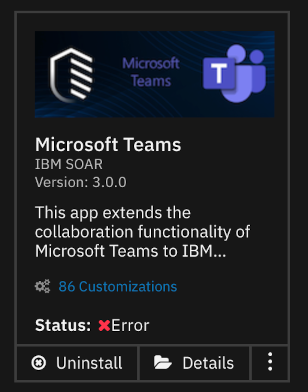
Bi-directional App for Sumo Logic Cloud SIEM. Query Sumo Logic for insights based on user-defined query parameters and create and update cases in SOAR.
Key Features¶
Poll Sumo Logic insights and create and update the corresponding cases in SOAR
Allow user to specify insight polling filters to limit insights escalated to SOAR
Create artifacts in SOAR case from Sumo Logic entities
Create hits on SOAR artifacts based on the corresponding entity’s Signal Severity Total in Sumo Logic via automatic or manual playbooks
Synchronize comments and notes between Sumo Logic insight and corresponding SOAR case
View insight signal details in the Signals data table
Write the insight, signal and entity full JSON data from Sumo Logic to a note in SOAR
Post tags to an insight from SOAR
Sumo Logic custom incident tab that contains insight custom fields, a link back to the insight in Sumo Logic and the Signals data table
Requirements¶
This app supports the IBM Security QRadar SOAR Platform and the IBM Security QRadar SOAR for IBM Cloud Pak for Security.
SOAR platform¶
The SOAR platform supports two app deployment mechanisms, Edge Gateway (also known as App Host) and integration server.
If deploying to a SOAR platform with an App Host, the requirements are:
SOAR platform >=
51.0.0.0.The app is in a container-based format (available from the AppExchange as a
zipfile).
If deploying to a SOAR platform with an integration server, the requirements are:
SOAR platform >=
51.0.0.0.The app is in the older integration format (available from the AppExchange as a
zipfile which contains atar.gzfile).Integration server is running
resilient-circuits>=51.0.0.If using an API key account, make sure the account provides the following minimum permissions:
Name
Permissions
Org Data
Read
Function
Read
Incidents
Read, Create
Edit Incidents
Fields, Status
Layouts
Read, Edit
The following SOAR platform guides provide additional information:
Edge Gateway Deployment Guide or App Host Deployment Guide: provides installation, configuration, and troubleshooting information, including proxy server settings.
Integration Server Guide: provides installation, configuration, and troubleshooting information, including proxy server settings.
System Administrator Guide: provides the procedure to install, configure and deploy apps.
The above guides are available on the IBM Documentation website at ibm.biz/soar-docs. On this web page, select your SOAR platform version. On the follow-on page, you can find the Edge Gateway Deployment Guide, App Host Deployment Guide, or Integration Server Guide by expanding Apps in the Table of Contents pane. The System Administrator Guide is available by expanding System Administrator.
Cloud Pak for Security¶
If you are deploying to IBM Cloud Pak for Security, the requirements are:
IBM Cloud Pak for Security >=
1.10.Cloud Pak is configured with an Edge Gateway.
The app is in a container-based format (available from the AppExchange as a
zipfile).
The following Cloud Pak guides provide additional information:
Edge Gateway Deployment Guide or App Host Deployment Guide: provides installation, configuration, and troubleshooting information, including proxy server settings. From the Table of Contents, select Case Management and Orchestration & Automation > Orchestration and Automation Apps.
System Administrator Guide: provides information to install, configure, and deploy apps. From the IBM Cloud Pak for Security IBM Documentation table of contents, select Case Management and Orchestration & Automation > System administrator.
These guides are available on the IBM Documentation website at ibm.biz/cp4s-docs. From this web page, select your IBM Cloud Pak for Security version. From the version-specific IBM Documentation page, select Case Management and Orchestration & Automation.
Proxy Server¶
The app does support a proxy server.
Python Environment¶
Python 3.9, 3.11, and 3.12 are officially supported. When deployed as an app, the app runs on Python 3.11. Additional package dependencies may exist for each of these packages:
resilient-circuits>=51.0.0
Sumo Logic Development Version¶
This app has been implemented using:
Product Name |
Product Version |
API URL |
API Version |
|---|---|---|---|
Sumo Logic Cloud SIEM |
N/A |
https://api.sumologic.com/api |
v1 |
Prerequisites¶
A Sumo Logic Log Analytics Platform user account in which Cloud SIEM Enterprise is enabled.
Configuration¶
Generate an Access Key and Secret in Sumo Log Analytics Platform¶
In the lower left corner of the Sumo Logic panel in the User Account Preferences menu item, Click on the + Add Access Key blue button:
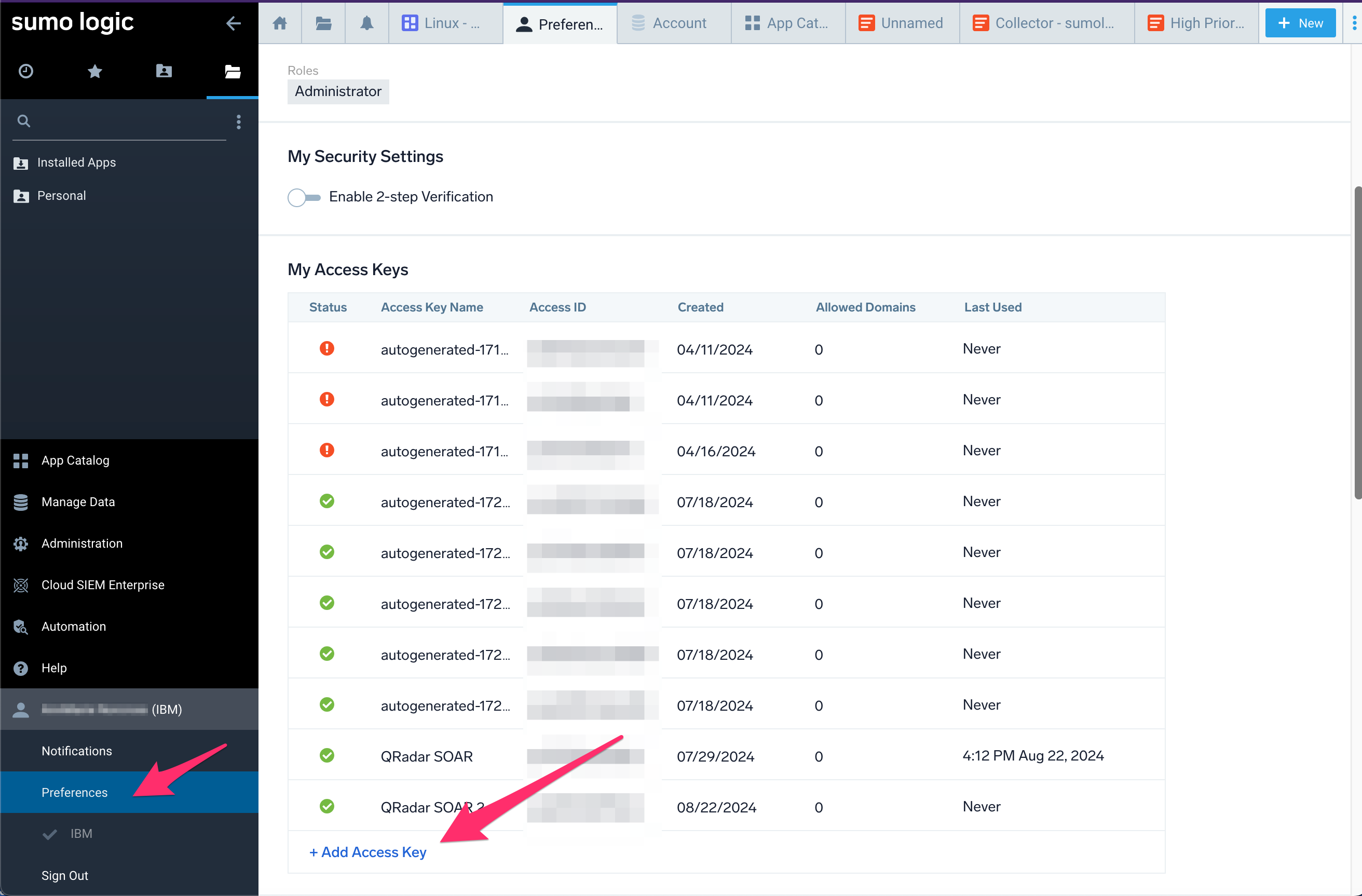
In the Create an Access Key dialog, enter an Access Key Name and Click the blue Create Key button.
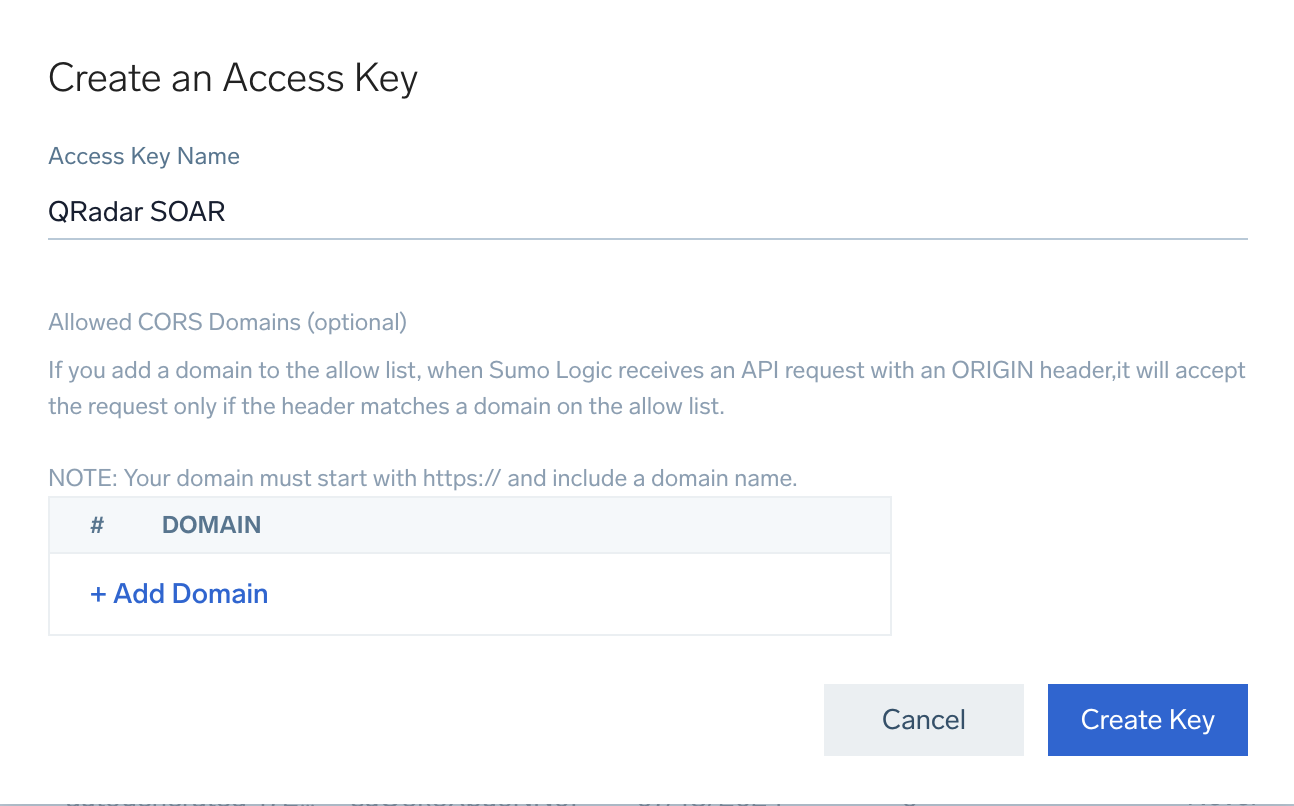
Copy the Access ID and Access Key for use in the app.config file.
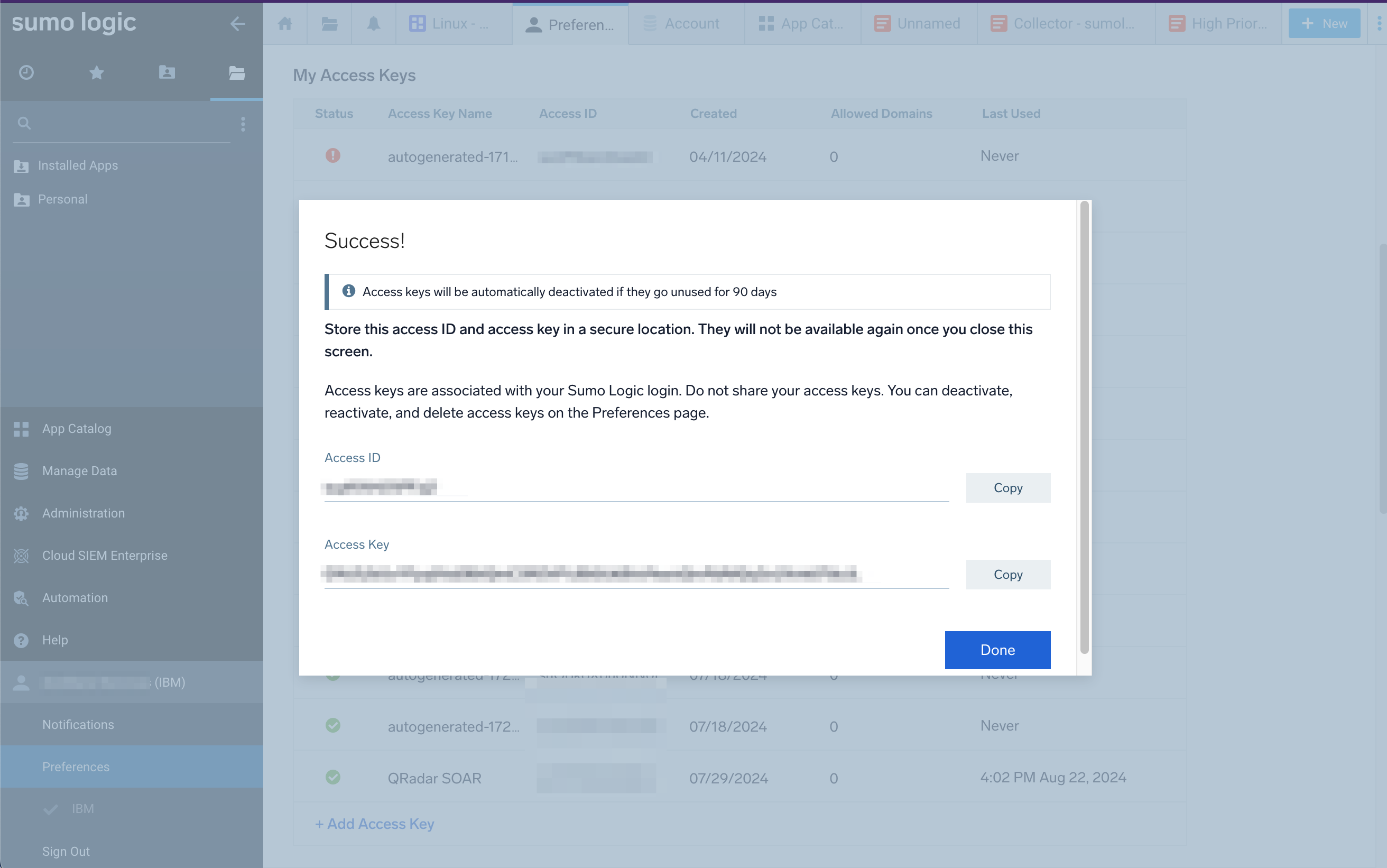 ¶
¶
Installation¶
Install¶
To install or uninstall an App or Integration on the SOAR platform, see the documentation at ibm.biz/soar-docs.
To install or uninstall an App on IBM Cloud Pak for Security, see the documentation at ibm.biz/cp4s-docs and follow the instructions above to navigate to Orchestration and Automation.
App Configuration¶
The following table provides the settings you need to configure the app. These settings are made in the app.config file. See the documentation discussed in the Requirements section for the procedure.
Config |
Required |
Example |
Description |
|---|---|---|---|
access_id |
Yes |
|
Sumo Logic Access ID. |
access_key |
Yes |
|
Sumo Logic Access Key. |
api_endpoint_url |
Yes |
|
Sumo Logic REST API endpoint URL. See Sumo Logic documentation to determine URL for your region: https://help.sumologic.com/docs/api/getting-started/#which-endpoint-should-i-should-use . |
console_url |
Yes |
|
Sumo Logic console URL - used to create links back to Sumo Logic Insight. |
polling_interval |
Yes |
|
Poller interval time in seconds. Value of zero turns poller off. |
polling_lookback |
Yes |
|
Number of minutes to lookback for queries the first time the poller runs. |
polling_add_case_url_comment_in_sumo_logic |
No |
|
Boolean flag indicating whether or not to add a comment in the Sumo Logic Insight that contains the URL link back to corresponding SOAR case. |
polling_filters |
No |
|
Polling filters to limit escalated insights - Sumo Logic DSL query statement - each query parameter separated by a space. |
soar_create_case_template |
No |
|
Path to override template for automatic case creation. See Poller Considerations. |
soar_update_case_template |
No |
|
Path to override template for automatic case updating. See Poller Considerations. |
soar_close_case_template |
No |
|
Path to override template for automatic case closing. See Poller Considerations. |
Poller Considerations¶
When the poller is enabled, cases are automatically escalated from this app. Any updates are checked at the cadence defined by the value set for polling_interval. It is possible, however, to escalate cases from other sources.
In this scenario, the poller would be disabled by setting polling_interval=0 and a separate source might capture a case from the endpoint and in turn create a case in SOAR. This app can still be useful for enrichment of that
newly created case even though it was not directly escalated from this app. As long as the reference ID (i.e. alert ID, event ID, etc…) for each case is preserved, all remaining details will synchronize to the SOAR case through this app automatically.
Sumo Logic REST API does not allow querying insights based on insight field lastUpdated timestamp. In order to implement bidirectional synchronization between Sumo Logic insights and SOAR cases, all Sumo Logic insights that have cases in SOAR are fetched and each case is updated on each polling interval. Take this overhead into consideration when determining the polling_interval, especially if you have a large number of Sumo Logic cases in SOAR.
Insights Filtering¶
To limit the number of insights escalated to SOAR, consider using the optional polling_filters parameter in the app configuration file. The query string format is documented in Sumo Logic at: https://api.sumologic.com/docs/sec/#operation/GetInsights and below:
The search query string uses sumo logic custom DSL that is used to filter the results.
Each filter is in the format field:operator:value. Multiple filters are separated by a space.
Operators:
exampleField:"bar": The value of the field is equal to “bar”.exampleField:in("bar", "baz", "qux"): The value of the field is equal to either “bar”, “baz”, or “qux”.exampleTextField:contains("foo bar"): The value of the field contains the phrase “foo bar”.exampleNumField:>5: The value of the field is greater than 5. There are similar<,<=, and>=operators.exampleNumField:5..10: The value of the field is between 5 and 10 (inclusive).exampleDateField:>2019-02-01T05:00:00+00:00: The value of the date field is after 5 a.m. UTC time on February 2, 2019.exampleDateField:2019-02-01T05:00:00+00:00..2019-02-01T08:00:00+00:00: The value of the date field is between 5 a.m. and 8 a.m. UTC time on February 2, 2019.
Fields:
readableId
status
statusId
name
insightId
serialId
description
created
timestamp
closed
assignee
entity.id
entity.ip
entity.hostname
entity.username
entity.sensorZone
entity.type
entity.value
involvedEntities.id
involvedEntities.type,
involvedEntities.value
enrichment
sensorZone
tag
severity
resolution
subResolution
ruleId
records
confidence
NOTE: The poller uses the created field to escalate new insights to SOAR, so this insight field should not be used to filter insights.
Polling Filter Examples¶
polling_filters = status:in("inprogress","new","closed") confidence:>=.85 severity:>="HIGH"
In this example, the query will return all insights with a status of either “inprogress”, “new”, and “closed” AND a confidence greater than or equal to .85 AND a severity greater than or equal to “HIGH” (which includes values “HIGH” or “CRITICAL”).
Poller Templates for SOAR Cases¶
It may be necessary to modify the templates used to create, update, or close SOAR cases based on your required custom fields in SOAR.
This is especially relevant if you have required custom close fields that need to be filled when closing a case in SOAR. If that is the case, be sure to implement a custom close_case_template and reference those required close fields in the template.
When overriding the template in App Host, specify the file path for each file as /var/rescircuits.
Below are the default templates used which can be copied, modified, and used with app_config’s
soar_create_case_template, soar_update_case_template, and soar_close_case_template settings to override the default templates.
soar_create_case.jinja
{
{# JINJA template for creating a new SOAR incident from an endpoint #}
{# See https://ibmresilient.github.io/resilient-python-api/pages/resilient-lib/resilient-lib.html#module-resilient_lib.components.templates_common
for details on available jinja methods. Examples for `soar_substitute` and more are included below.
#}
{% set severity_mapping = '''{
"CRITICAL": "High",
"HIGH": "High",
"MEDIUM": "Medium",
"LOW": "Low"
}'''
%}
{# modify to specify your specific **data** fields #}
"name": "Sumo Logic {{ readableId }} - {{ name }}",
"description": "{{ description | replace('"', '\\"') }}",
{# start_date cannot be after discovered_date #}
{% set start_date = created if created <= created else created %}
"discovered_date": {{ created| soar_datetimeformat(split_at='.') }},
"start_date": {{ start_date | soar_datetimeformat(split_at='.') }},
{# if alert users are different than SOAR users, consider using a mapping table using soar_substitute: #}
{# "owner_id": "{{ **assignedTo** |soar_substitute('{"Automation": "soar_user1@example.com", "default_user@example.com": "soar_user2@example.com", "DEFAULT": "default_user@example.com" }') }}", #}
"plan_status": "A",
"severity_code": "{{ severity | soar_substitute(severity_mapping) }}",
{# specify your custom fields for your endpoint solution #}
"properties": {
"sumo_logic_insight_id": "{{ id }}"
}
}
soar_update_case.jinja
{
{# JINJA template for updating a new SOAR incident from an endpoint #}
{# modify to specify your specific **data** fields #}
{% set severity_mapping = '''{
"CRITICAL": "High",
"HIGH": "High",
"MEDIUM": "Medium",
"LOW": "Low"
}'''
%}
"severity_code": "{{ severity | soar_substitute(severity_mapping) }}",
{# specify your custom fields for your endpoint solution #}
"properties": {
"sumo_logic_insight_global_confidence": {{ (confidence*100)|int }},
"sumo_logic_insight_assignee": "{{ assignee.displayName }} ({{assignee.username}})",
"sumo_logic_insight_status": "{{ status.displayName }}",
"sumo_logic_insight_readable_id": "{{ readableId }}",
"sumo_logic_insight_resolution": "{{ resolution }}",
"sumo_logic_insight_source": "{{ source }}",
"sumo_logic_insight_sub_resolution": "{{ subResolution }}",
"sumo_logic_insight_link": "<a target='_blank' href='{{ entity_url }}'>Insight</a>"
{% if tags %}
,"sumo_logic_insight_tags": "{{ tags | join(', ') }}"
{% endif %}
}
}
soar_close_case.jinja
{
{# JINJA template for closing a SOAR incident using endpoint data #}
{# modify to specify your specific **data** fields #}
"plan_status": "C",
"resolution_id": "{{ resolution | soar_substitute('{"False Positive": "Not an Issue", "Resolved": "Resolved", "Duplicate": "Duplicate", "No Action": "Unresolved" }') }}",
"resolution_summary": "Closed by Sumo Logic, Insight Status: {{ status.displayName }}"
{# add additional fields based on your 'on close' field requirements #}
{#
,"properties": {
"your_custom_field": "value"
}
#}
}
Function - Sumo Logic: Add Comment to Insight¶
Post a comment to a Sumo Logic insight in Sumo Logic.
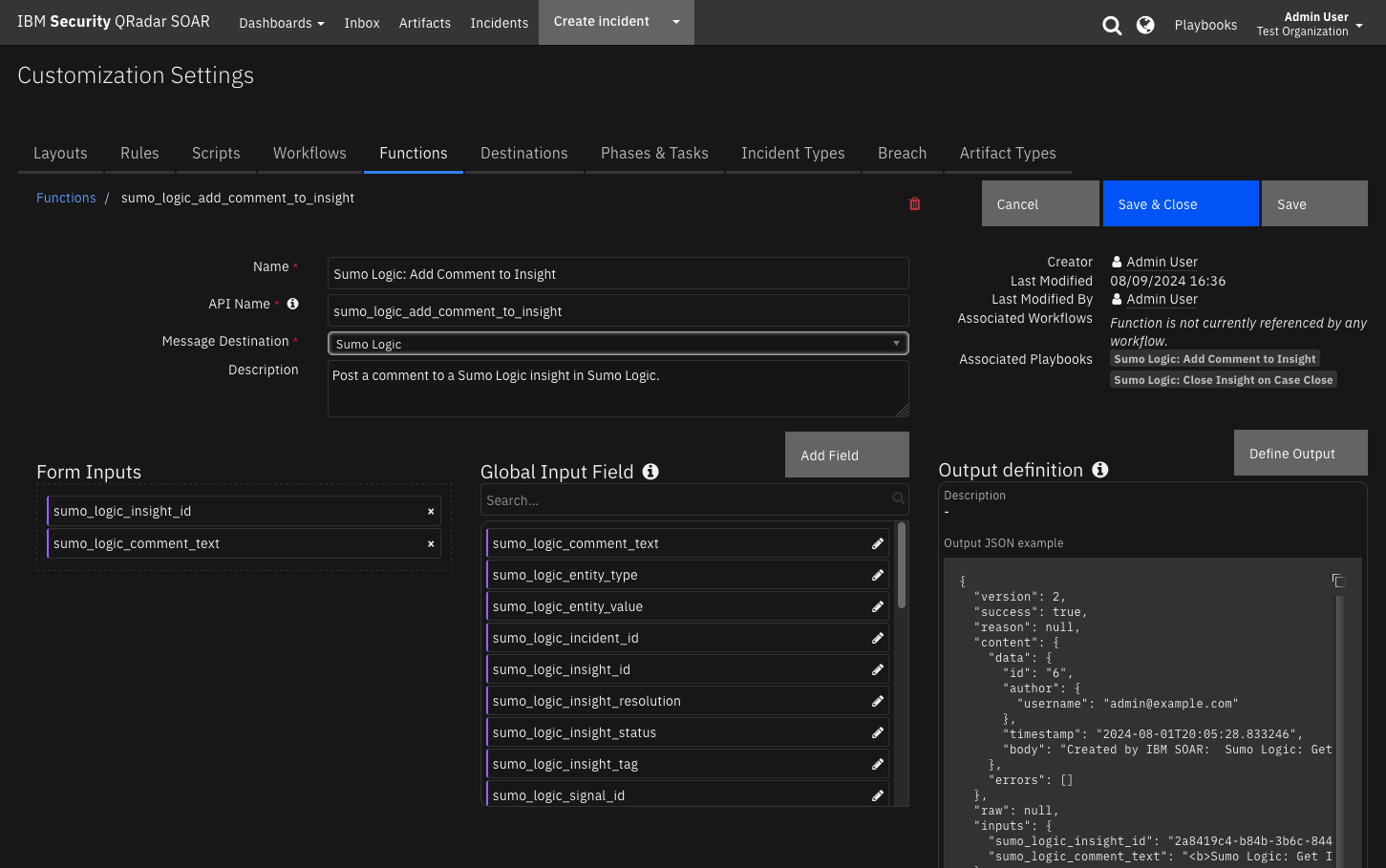
Inputs:
Name |
Type |
Required |
Example |
Tooltip |
|---|---|---|---|---|
|
|
Yes |
|
- |
|
|
Yes |
|
- |
Outputs:
NOTE: This example might be in JSON format, but
resultsis a Python Dictionary on the SOAR platform.
results = {
"content": {
"data": {
"author": {
"username": "admin@example.com"
},
"body": "Created by IBM SOAR: Sumo Logic: Get Insight Comments playbook created 1 notes in SOAR.",
"id": "6",
"timestamp": "2024-08-01T20:05:28.833246"
},
"errors": []
},
"inputs": {
"sumo_logic_comment_text": "\u003cb\u003eSumo Logic: Get Insight Comments\u003c/b\u003e playbook created 1 notes in SOAR.",
"sumo_logic_insight_id": "2a8419c4-b84b-3b6c-8447-af4ccbfba9c6"
},
"metrics": {
"execution_time_ms": 9515,
"host": "my.app.host",
"package": "fn-sumo-logic",
"package_version": "1.0.0",
"timestamp": "2024-08-01 16:05:30",
"version": "1.0"
},
"raw": null,
"reason": null,
"success": true,
"version": 2.0
}
Example Function Input Script:
inputs.sumo_logic_insight_id = incident.properties.sumo_logic_insight_id
inputs.sumo_logic_comment_text = note.text.content
Example Function Post Process Script:
from datetime import datetime
results = playbook.functions.results.add_comment_to_insight_results
# Edit note in SOAR to indicate it was sent to CBC alert
if results.get("success"):
# Get the current time
now = datetime.now()
note.text = u"<b>Post comment to Sumo Logic insight at {0}</b><br>{1}".format(now, note.text.content)
Function - Sumo Logic: Add Tag to Insight¶
Add a tag to a Sumo Logic insight in Sumo Logic.
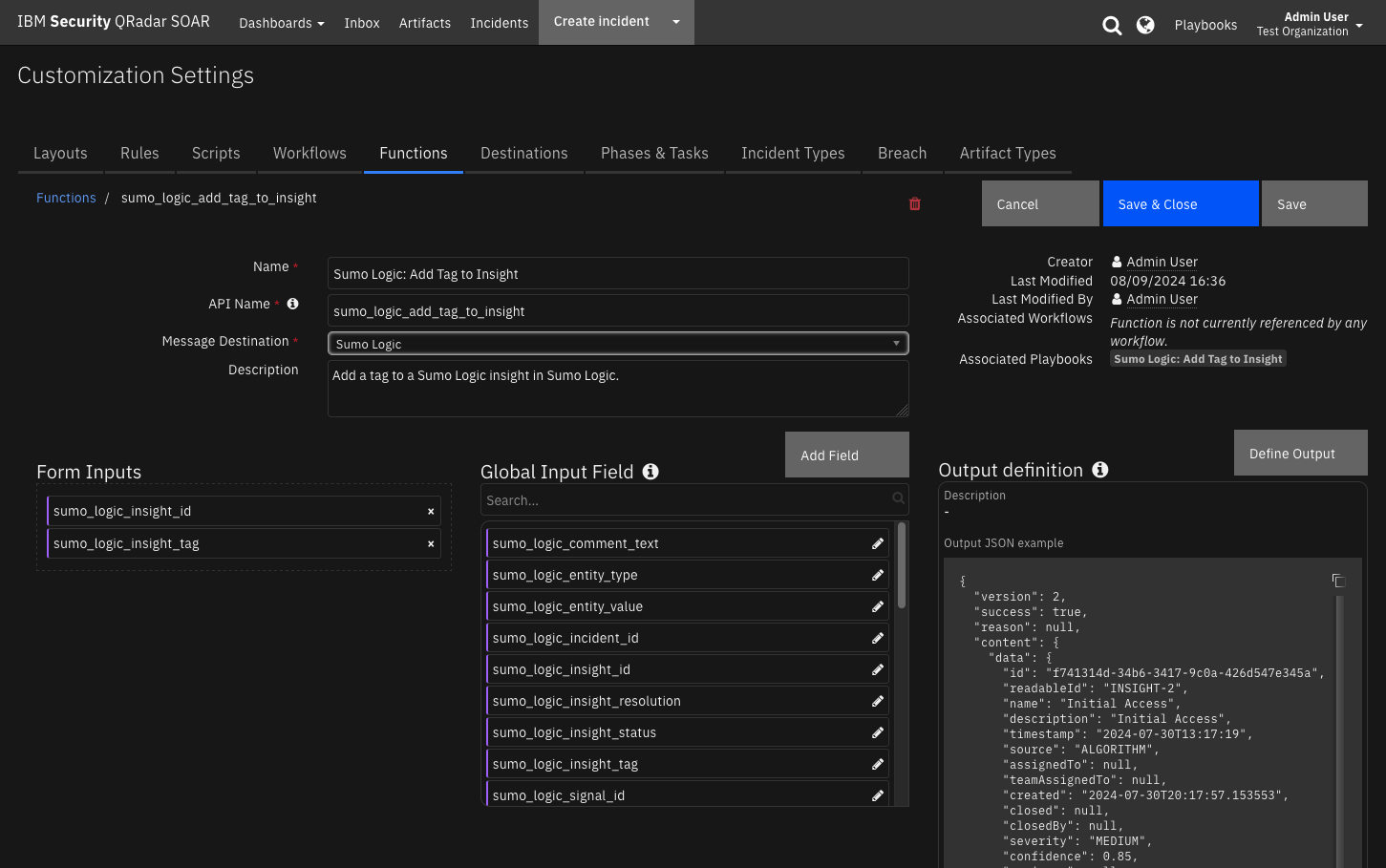
Inputs:
Name |
Type |
Required |
Example |
Tooltip |
|---|---|---|---|---|
|
|
Yes |
|
- |
|
|
Yes |
|
- |
Outputs:
NOTE: This example might be in JSON format, but
resultsis a Python Dictionary on the SOAR platform.
results = {
"content": {
"data": {
"artifacts": [],
"assignedTo": null,
"assignee": null,
"closed": null,
"closedBy": null,
"confidence": 0.85,
"created": "2024-07-30T20:17:57.153553",
"description": "Initial Access",
"entity": {
"entityType": "_username",
"hostname": null,
"id": "_username-root",
"macAddress": null,
"name": "root",
"sensorZone": "",
"value": "root"
},
"id": "f741314d-34b6-3417-9c0a-426d547e345a",
"involvedEntities": [
{
"entityType": "_process",
"hostname": null,
"id": "_process-sshd",
"macAddress": null,
"name": "sshd",
"sensorZone": null,
"value": "sshd"
},
{
"entityType": "_username",
"hostname": null,
"id": "_username-root",
"macAddress": null,
"name": "root",
"sensorZone": null,
"value": "root"
},
{
"entityType": "_ip",
"hostname": null,
"id": "_ip-9.108.160.132",
"macAddress": null,
"name": "9.108.160.132",
"sensorZone": null,
"value": "9.108.160.132"
},
{
"entityType": "_hostname",
"hostname": "sumologic1",
"id": "_hostname-sumologic1",
"macAddress": null,
"name": "sumologic1",
"sensorZone": null,
"value": "sumologic1"
}
],
"lastUpdated": "2024-08-01T13:18:50.606099",
"lastUpdatedBy": null,
"name": "Initial Access",
"orgId": "0000000000BD6D7C",
"readableId": "INSIGHT-2",
"resolution": null,
"severity": "MEDIUM",
"signals": [
{
"allRecords": [
{
"baseImage": "sshd",
"bro_dns_answers": [],
"bro_file_bytes": {},
"bro_file_connUids": [],
"bro_flow_service": [],
"bro_ftp_pendingCommands": [],
"bro_http_cookieVars": [],
"bro_http_origFuids": [],
"bro_http_origMimeTypes": [],
"bro_http_request_headers": {},
"bro_http_request_proxied": [],
"bro_http_response_headers": {},
"bro_http_response_respFuids": [],
"bro_http_response_respMimeTypes": [],
"bro_http_tags": [],
"bro_http_uriVars": [],
"bro_kerberos_clientCert": {},
"bro_kerberos_serverCert": {},
"bro_sip_headers": {},
"bro_sip_requestPath": [],
"bro_sip_responsePath": [],
"bro_ssl_certChainFuids": [],
"bro_ssl_clientCertChainFuids": [],
"cseSignal": {},
"day": 30,
"device_hostname": "sumologic1",
"device_hostname_raw": "sumologic1",
"dstDevice_hostname": "sumologic1",
"dstDevice_hostname_raw": "sumologic1",
"fieldTags": {},
"fields": {
"event_id": "sshd-failed-invalid-password",
"source_ip": "9.108.160.132",
"source_port": "53371",
"ssh_version": "ssh2",
"syslog_hostname": "sumologic1",
"syslog_message": "Failed password for root from 9.108.160.132 port 53371 ssh2",
"syslog_process": "sshd",
"syslog_process_id": "35224",
"syslog_timestamp": "Jul 30 13:17:19",
"user": "root"
},
"friendlyName": "record",
"hour": 13,
"http_requestHeaders": {},
"listMatches": [],
"matchedItems": [],
"metadata_deviceEventId": "sshd-failed-invalid-password",
"metadata_mapperName": "Linux OS Syslog - Process sshd - SSH Auth Failure Invalid Password",
"metadata_mapperUid": "05445189-0e1e-425a-8f2b-5d1f41e9546e",
"metadata_orgId": "0000000000BD6D7C",
"metadata_parseTime": 1722370665323,
"metadata_parser": "/Parsers/System/Linux/Linux OS Syslog",
"metadata_product": "Linux OS Syslog",
"metadata_productGuid": "0e20c932-d992-4bd4-b276-c15119ca5c0b",
"metadata_receiptTime": 1722370640,
"metadata_schemaVersion": 3,
"metadata_sensorId": "0000000000BD6D7C",
"metadata_sensorInformation": {},
"metadata_sensorZone": "default",
"metadata_sourceBlockId": "2295449033841068855",
"metadata_sourceCategory": "linux/system",
"metadata_sourceMessageId": "-7272543713819412727",
"metadata_vendor": "Linux",
"month": 7,
"normalizedAction": "logon",
"objectClassification": "Authentication",
"objectType": "Authentication",
"pid": 35224,
"srcDevice_ip": "9.108.160.132",
"srcDevice_ip_ipv4IntValue": 158113924,
"srcDevice_ip_isInternal": false,
"srcDevice_ip_version": 4,
"srcPort": 53371,
"success": false,
"timestamp": 1722345439000,
"uid": "aac19471-8442-5536-9742-bcc5aacc1e80",
"user_username": "root",
"user_username_raw": "root",
"year": 2024
}
],
"artifacts": [],
"contentType": "RULE",
"created": "2024-07-30T13:17:19",
"description": "Detects multiple failed login attempts for the same username over a 24 hour timeframe. This is designed to catch both slow and quick brute force type attacks. The threshold and time frame can be adjusted based on the customer\u0027s environment.",
"entity": {
"entityType": "_username",
"hostname": null,
"id": "_username-root",
"macAddress": null,
"name": "root",
"sensorZone": "",
"value": "root"
},
"id": "f16f0e84-66c4-50c7-a0b2-b02b5cbdd543",
"name": "Brute Force Attempt",
"recordCount": 1,
"recordSearchDetails": {
"query": "_index=sec_record_* | json field=_raw \"resultType\" as _unpacked__raw_resultType nodrop\n| where (if (isNull(objectType), false, objectType == \"Authentication\") and if (isNull(normalizedAction), false, normalizedAction == \"logon\") and if (isNull(success), false, !(success)) and !(if (isNull(metadata_deviceEventId), false, metadata_deviceEventId == \"Security-4776\") and !isBlank(listMatches) AND jsonArrayContains(listMatches, \"domain_controllers\")) and !(if (isNull(metadata_vendor), false, metadata_vendor == \"Microsoft\") and if (isNull(metadata_product), false, metadata_product == \"Azure\") and if (isNull(_unpacked__raw_resultType), false, _unpacked__raw_resultType == \"700082\")) and !(metadata_vendor in (\"Microsoft\", \"Intersect Alliance\") and metadata_product in (\"Windows\", \"Snare Enterprise Agent for Windows\") and user_username matches /^[\\s\\S]*\\$[\\s\\S]*$/) and !(!isBlank(listMatches) AND jsonArrayContains(listMatches, \"vuln_scanners\")) and if (isNull(metadata_deviceEventId), false, metadata_deviceEventId == \"sshd-failed-invalid-password\") and if (isNull(metadata_product), false, metadata_product == \"Linux OS Syslog\") and if (isNull(metadata_vendor), false, metadata_vendor == \"Linux\") and if (isNull(user_username), false, user_username == \"root\"))",
"queryEndTime": "2024-07-30T14:24:00",
"queryStartTime": "2024-07-29T14:24:00"
},
"recordTypes": [],
"ruleId": "THRESHOLD-S00096",
"severity": 4,
"stage": "Initial Access",
"tags": [
"_mitreAttackTactic:TA0006",
"_mitreAttackTechnique:T1078",
"_mitreAttackTactic:TA0001",
"_mitreAttackTechnique:T1110.001",
"_mitreAttackTechnique:T1110.002",
"_mitreAttackTactic:TA0008",
"_mitreAttackTechnique:T1110",
"_mitreAttackTechnique:T1586"
],
"timestamp": "2024-07-30T13:17:19"
}
],
"source": "ALGORITHM",
"status": {
"displayName": "In Progress",
"name": "inprogress"
},
"subResolution": null,
"tags": [
"New tag",
"_mitreAttackTactic:TA0001",
"_mitreAttackTactic:TA0006",
"_mitreAttackTactic:TA0008",
"_mitreAttackTechnique:T1078",
"_mitreAttackTechnique:T1110",
"_mitreAttackTechnique:T1110.001",
"_mitreAttackTechnique:T1110.002",
"_mitreAttackTechnique:T1586"
],
"teamAssignedTo": null,
"timeToDetection": 25238.153553,
"timeToRemediation": null,
"timeToResponse": 147653.411281,
"timestamp": "2024-07-30T13:17:19"
},
"errors": []
},
"inputs": {
"sumo_logic_insight_id": "f741314d-34b6-3417-9c0a-426d547e345a",
"sumo_logic_insight_tag": "New tag"
},
"metrics": {
"execution_time_ms": 151744,
"host": "my.app.host",
"package": "fn-sumo-logic",
"package_version": "1.0.0",
"timestamp": "2024-08-02 13:49:08",
"version": "1.0"
},
"raw": null,
"reason": null,
"success": true,
"version": 2.0
}
Example Function Input Script:
inputs.sumo_logic_insight_id = incident.properties.sumo_logic_insight_id
inputs.sumo_logic_insight_tag = playbook.inputs.sumo_logic_insight_tag
Example Function Post Process Script:
results = playbook.functions.results.add_tag_results
if results.get("success"):
content = results.get("content")
if content:
data = content.get("data", None)
tags = data.get("tags", None)
incident.properties.sumo_logic_insight_tags = ", ".join(tags) if isinstance(tags, list) else None
note_text = f"<b>Sumo Logic Add Tag to Insight:</b> {playbook.inputs.sumo_logic_insight_tag} added."
else:
note_text = "<b>Sumo Logic: Add Tag to Insight</b> failed to post tag(s) - no content."
else:
reason = results.get("reason")
note_text = "<b>VMware CBC: Add Tag to Insight</b> failed to add tag(s) {reason}."
incident.addNote(note_text)
Function - Sumo Logic: Get Entity¶
Query Sumo Logic to get details of an entity.
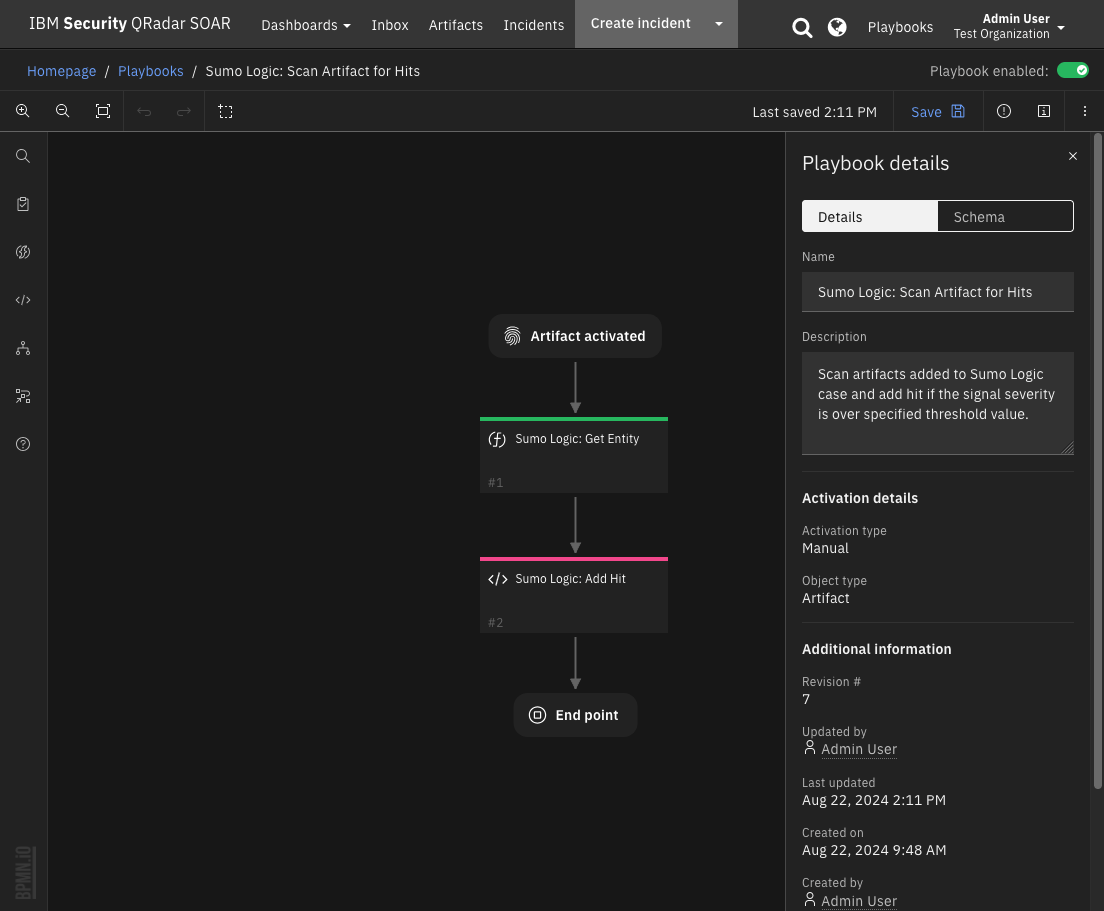
The Sumo Logic: Scan Artifact for Hits playbooks create hits on artifacts based on the Signal Severity score associated with Sumo Logic entities.
NOTE: Edit the following playbook post-script variable to set the minimum threshold at which a hit is added to an artifact:
MINIMUM_RECENT_SIGNAL_SEVERITY = 8
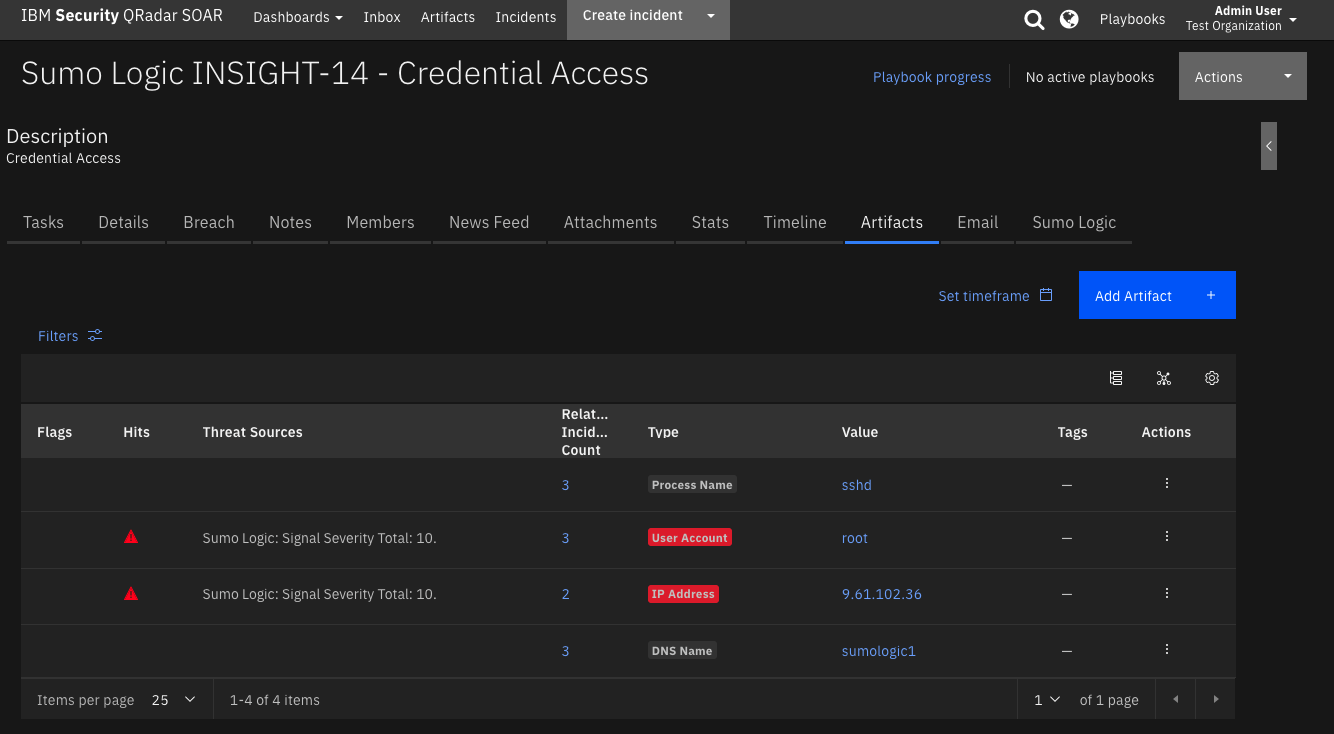
Inputs:
Name |
Type |
Required |
Example |
Tooltip |
|---|---|---|---|---|
|
|
No |
|
- |
|
|
No |
|
- |
Outputs:
NOTE: This example might be in JSON format, but
resultsis a Python Dictionary on the SOAR platform.
results = {
"content": [
{
"activityScore": 0,
"criticality": null,
"entityType": "_ip",
"firstSeen": null,
"hostname": null,
"id": "_ip-9.61.102.36",
"isSuppressed": false,
"lastSeen": "2024-08-20T08:39:03",
"macAddress": null,
"name": "9.61.102.36",
"recentSignalSeverity": 10,
"reputation": null,
"sensorZone": null,
"tags": [],
"value": "9.61.102.36"
}
],
"inputs": {
"sumo_logic_entity_type": "_ip",
"sumo_logic_entity_value": "9.61.102.36",
"sumo_logic_insight_id": "0b5f00b6-b14d-3492-9564-28bd98610a29"
},
"metrics": {
"execution_time_ms": 7397,
"host": "my.app.host",
"package": "fn-sumo-logic",
"package_version": "1.0.0",
"timestamp": "2024-08-21 11:39:58",
"version": "1.0"
},
"raw": null,
"reason": null,
"success": true,
"version": 2.0
}
Example Function Input Script:
ARTIFACT_TYPE_MAPPING = {
"DNS Name": "_hostname",
"IP Address": "_ip",
"File Path": "_file",
"MAC Address": "_mac",
"Process Name": "_process",
"User Account": "_username",
"User Agent": "_useragent",
"URL": "_url"
}
inputs.sumo_logic_entity_type = ARTIFACT_TYPE_MAPPING.get(artifact.type, None)
if not inputs.sumo_logic_entity_type:
helper.fail(f"Artifact {artifact.type} not mapped.")
inputs.sumo_logic_entity_value = artifact.value
Example Function Post Process Script:
# Edit the following variable to change the minimum threshold at which a hit is added to an artifact.
MINIMUM_RECENT_SIGNAL_SEVERITY = 8
results = playbook.functions.results.get_entity_results
note_text = "<b>Sumo Logic Automatic Scan Artifact:</b><br>"
if results.get("success"):
content = results.get("content")
if content:
data = content.get("data", {})
if data:
total = data.get("total", 0)
if total >= 1:
objects = data.get("objects", [])
if total >= 1:
entity = objects[0]
recent_signal_severity = entity.get("recentSignalSeverity")
if recent_signal_severity >= MINIMUM_RECENT_SIGNAL_SEVERITY:
# Create a hit on the artifact.
hit = [
{
"name": "Artifact Value",
"type": "string",
"value": f"{artifact.value}"
}
]
artifact.addHit(f"Sumo Logic: Signal Severity Total: {recent_signal_severity}.", hit)
note_text = f"{note_text} Hit added on <b>{artifact.type} {artifact.value}</b> with Signal Severity Total: <b>{recent_signal_severity}</b>."
incident.addNote(note_text)
Function - Sumo Logic: Get Insight By ID¶
Get the details of a Sumo Logic insight given the insight ID.
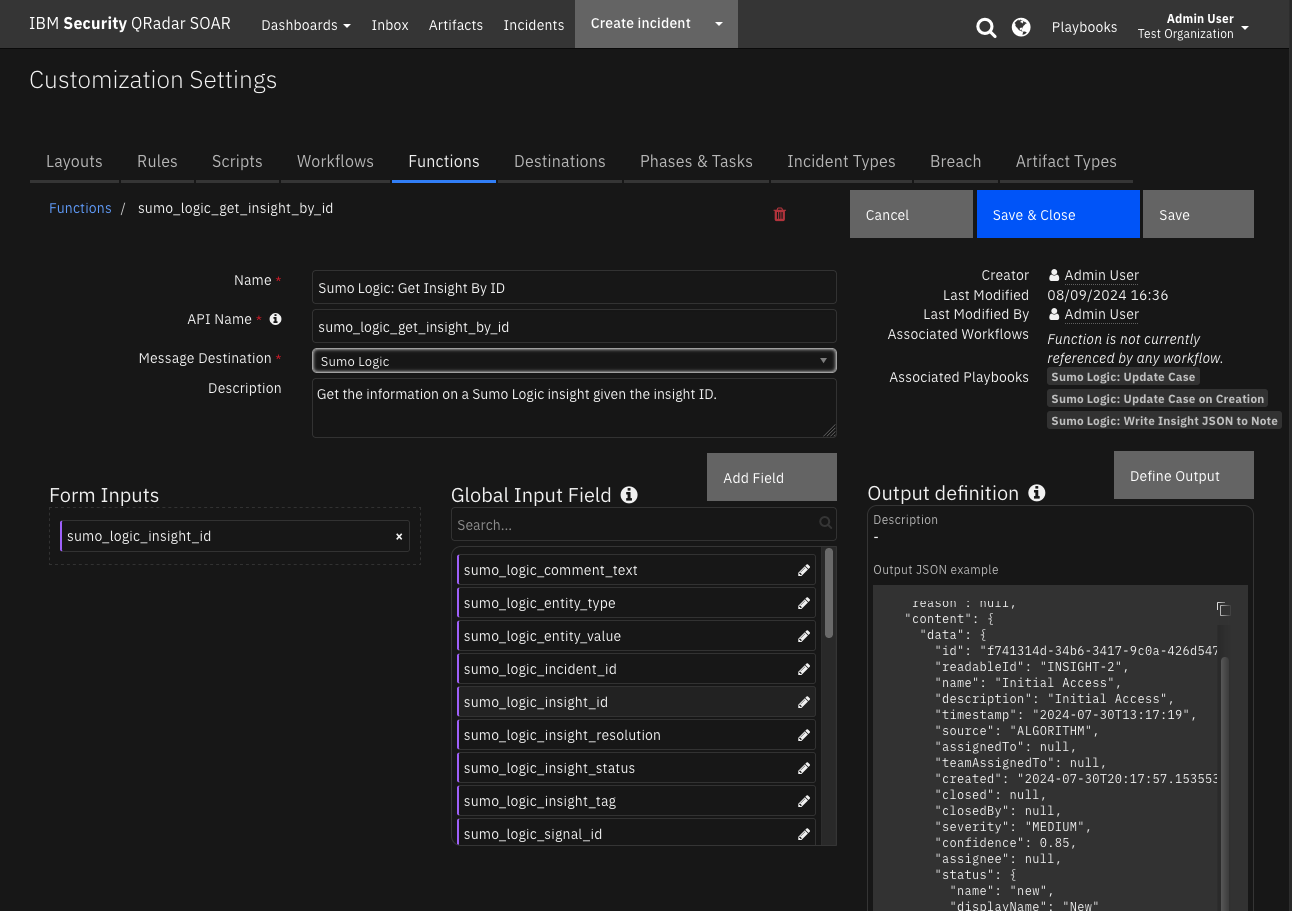
Inputs:
Name |
Type |
Required |
Example |
Tooltip |
|---|---|---|---|---|
|
|
Yes |
|
- |
Outputs:
NOTE: This example might be in JSON format, but
resultsis a Python Dictionary on the SOAR platform.
results = {
"content": {
"data": {
"artifacts": [],
"assignedTo": null,
"assignee": null,
"closed": null,
"closedBy": null,
"confidence": 0.85,
"created": "2024-07-30T20:17:57.153553",
"description": "Initial Access",
"entity": {
"entityType": "_username",
"hostname": null,
"id": "_username-root",
"macAddress": null,
"name": "root",
"sensorZone": "",
"value": "root"
},
"id": "f741314d-34b6-3417-9c0a-426d547e345a",
"involvedEntities": [
{
"entityType": "_process",
"hostname": null,
"id": "_process-sshd",
"macAddress": null,
"name": "sshd",
"sensorZone": null,
"value": "sshd"
},
{
"entityType": "_username",
"hostname": null,
"id": "_username-root",
"macAddress": null,
"name": "root",
"sensorZone": null,
"value": "root"
},
{
"entityType": "_ip",
"hostname": null,
"id": "_ip-9.108.160.132",
"macAddress": null,
"name": "9.108.160.132",
"sensorZone": null,
"value": "9.108.160.132"
},
{
"entityType": "_hostname",
"hostname": "sumologic1",
"id": "_hostname-sumologic1",
"macAddress": null,
"name": "sumologic1",
"sensorZone": null,
"value": "sumologic1"
}
],
"lastUpdated": "2024-07-30T20:18:10.061087",
"lastUpdatedBy": null,
"name": "Initial Access",
"orgId": "0000000000BD6D7C",
"readableId": "INSIGHT-2",
"recordSummaryFields": [],
"resolution": null,
"severity": "MEDIUM",
"signals": [
{
"allRecords": [
{
"baseImage": "sshd",
"bro_dns_answers": [],
"bro_file_bytes": {},
"bro_file_connUids": [],
"bro_flow_service": [],
"bro_ftp_pendingCommands": [],
"bro_http_cookieVars": [],
"bro_http_origFuids": [],
"bro_http_origMimeTypes": [],
"bro_http_request_headers": {},
"bro_http_request_proxied": [],
"bro_http_response_headers": {},
"bro_http_response_respFuids": [],
"bro_http_response_respMimeTypes": [],
"bro_http_tags": [],
"bro_http_uriVars": [],
"bro_kerberos_clientCert": {},
"bro_kerberos_serverCert": {},
"bro_sip_headers": {},
"bro_sip_requestPath": [],
"bro_sip_responsePath": [],
"bro_ssl_certChainFuids": [],
"bro_ssl_clientCertChainFuids": [],
"cseSignal": {},
"day": 30,
"device_hostname": "sumologic1",
"device_hostname_raw": "sumologic1",
"dstDevice_hostname": "sumologic1",
"dstDevice_hostname_raw": "sumologic1",
"fieldTags": {},
"fields": {
"event_id": "sshd-failed-invalid-password",
"source_ip": "90.8.160.132",
"source_port": "53371",
"ssh_version": "ssh2",
"syslog_hostname": "sumologic1",
"syslog_message": "Failed password for root from 90.8.160.132 port 53371 ssh2",
"syslog_process": "sshd",
"syslog_process_id": "35224",
"syslog_timestamp": "Jul 30 13:17:19",
"user": "root"
},
"friendlyName": "record",
"hour": 13,
"http_requestHeaders": {},
"listMatches": [],
"matchedItems": [],
"metadata_deviceEventId": "sshd-failed-invalid-password",
"metadata_mapperName": "Linux OS Syslog - Process sshd - SSH Auth Failure Invalid Password",
"metadata_mapperUid": "05445189-0e1e-425a-8f2b-5d1f41e9546e",
"metadata_orgId": "0000000000BD6D7C",
"metadata_parseTime": 1722370665323,
"metadata_parser": "/Parsers/System/Linux/Linux OS Syslog",
"metadata_product": "Linux OS Syslog",
"metadata_productGuid": "0e20c932-d992-4bd4-b276-c15119ca5c0b",
"metadata_receiptTime": 1722370640,
"metadata_schemaVersion": 3,
"metadata_sensorId": "0000000000BD6D7C",
"metadata_sensorInformation": {},
"metadata_sensorZone": "default",
"metadata_sourceBlockId": "2295449033841068855",
"metadata_sourceCategory": "linux/system",
"metadata_sourceMessageId": "-7272543713819412727",
"metadata_vendor": "Linux",
"month": 7,
"normalizedAction": "logon",
"objectClassification": "Authentication",
"objectType": "Authentication",
"pid": 35224,
"srcDevice_ip": "90.8.160.132",
"srcDevice_ip_ipv4IntValue": 158113924,
"srcDevice_ip_isInternal": false,
"srcDevice_ip_version": 4,
"srcPort": 53371,
"success": false,
"timestamp": 1722345439000,
"uid": "aac19471-8442-5536-9742-bcc5aacc1e80",
"user_username": "root",
"user_username_raw": "root",
"year": 2024
}
],
"artifacts": [],
"contentType": "RULE",
"created": "2024-07-30T13:17:19",
"description": "Detects multiple failed login attempts for the same username over a 24 hour timeframe. This is designed to catch both slow and quick brute force type attacks. The threshold and time frame can be adjusted based on the customer\u0027s environment.",
"entity": {
"entityType": "_username",
"hostname": null,
"id": "_username-root",
"macAddress": null,
"name": "root",
"sensorZone": "",
"value": "root"
},
"id": "f16f0e84-66c4-50c7-a0b2-b02b5cbdd543",
"name": "Brute Force Attempt",
"recordCount": 1,
"recordSearchDetails": {
"query": "_index=sec_record_* | json field=_raw \"resultType\" as _unpacked__raw_resultType nodrop\n| where (if (isNull(objectType), false, objectType == \"Authentication\") and if (isNull(normalizedAction), false, normalizedAction == \"logon\") and if (isNull(success), false, !(success)) and !(if (isNull(metadata_deviceEventId), false, metadata_deviceEventId == \"Security-4776\") and !isBlank(listMatches) AND jsonArrayContains(listMatches, \"domain_controllers\")) and !(if (isNull(metadata_vendor), false, metadata_vendor == \"Microsoft\") and if (isNull(metadata_product), false, metadata_product == \"Azure\") and if (isNull(_unpacked__raw_resultType), false, _unpacked__raw_resultType == \"700082\")) and !(metadata_vendor in (\"Microsoft\", \"Intersect Alliance\") and metadata_product in (\"Windows\", \"Snare Enterprise Agent for Windows\") and user_username matches /^[\\s\\S]*\\$[\\s\\S]*$/) and !(!isBlank(listMatches) AND jsonArrayContains(listMatches, \"vuln_scanners\")) and if (isNull(metadata_deviceEventId), false, metadata_deviceEventId == \"sshd-failed-invalid-password\") and if (isNull(metadata_product), false, metadata_product == \"Linux OS Syslog\") and if (isNull(metadata_vendor), false, metadata_vendor == \"Linux\") and if (isNull(user_username), false, user_username == \"root\"))",
"queryEndTime": "2024-07-30T14:24:00",
"queryStartTime": "2024-07-29T14:24:00"
},
"recordTypes": [],
"ruleId": "THRESHOLD-S00096",
"severity": 4,
"stage": "Initial Access",
"tags": [
"_mitreAttackTactic:TA0006",
"_mitreAttackTechnique:T1078",
"_mitreAttackTactic:TA0001",
"_mitreAttackTechnique:T1110.001",
"_mitreAttackTechnique:T1110.002",
"_mitreAttackTactic:TA0008",
"_mitreAttackTechnique:T1110",
"_mitreAttackTechnique:T1586"
],
"timestamp": "2024-07-30T13:17:19"
}
],
"source": "ALGORITHM",
"status": {
"displayName": "New",
"name": "new"
},
"subResolution": null,
"tags": [
"_mitreAttackTactic:TA0001",
"_mitreAttackTactic:TA0006",
"_mitreAttackTactic:TA0008",
"_mitreAttackTechnique:T1078",
"_mitreAttackTechnique:T1110",
"_mitreAttackTechnique:T1110.001",
"_mitreAttackTechnique:T1110.002",
"_mitreAttackTechnique:T1586"
],
"teamAssignedTo": null,
"timeToDetection": 25238.153553,
"timeToRemediation": null,
"timeToResponse": null,
"timestamp": "2024-07-30T13:17:19"
},
"errors": []
},
"inputs": {
"sumo_logic_insight_id": "f741314d-34b6-3417-9c0a-426d547e345a"
},
"metrics": {
"execution_time_ms": 7981,
"host": "my.app.host",
"package": "fn-sumo-logic",
"package_version": "1.0.0",
"timestamp": "2024-07-31 12:25:37",
"version": "1.0"
},
"raw": null,
"reason": null,
"success": true,
"version": 2.0
}
Example Function Input Script:
inputs.sumo_logic_insight_id = incident.properties.sumo_logic_insight_id
Example Function Post Process Script:
# Map Sumo Logic resolution values SOAR resolution id values.
# Duplicate — The insight has triggered before on the same entity and is a duplicate.
# False Positive—An insight triggered and it is legitimate activity.
# No Action—An insight triggered and it might not be an incident but is also not a false positive.
# Resolved — An incident occurred and was resolved.
MAPPING_RESOLUTION = {
"Duplicate" : "Duplicate",
"False Positive": "Resolved",
"No Action": "Resolved",
"Resolved" : "Resolved"
}
# Map Sumo Logic subResolution values to SOAR resolution id values.
MAPPING_SUB_RESOLUTION_ON_CLOSE = {
"None": "Resolved",
"False positive": "Not an Issue",
"True positive": "Resolved"
}
results = playbook.functions.results.get_insight_by_id_results
if not results.success:
incident.addNote("<b>Sumo Logic: Update Case on Creation:</b> Unable to get case data to update custom fields.")
else:
content = results.get("content", {})
if content:
data = content.get("data", None)
tags = data.get("tags", None)
incident.properties.sumo_logic_insight_tags = ", ".join(tags) if isinstance(tags, list) else None
entity_url = content.get("entity_url", None)
if entity_url:
incident.properties.sumo_logic_insight_link = "<a target='_blank' href='{0}'>Insight</a>".format(entity_url)
confidence = data.get("confidence", None)
incident.properties.sumo_logic_insight_global_confidence = int(confidence * 100) if confidence and (confidence <= 1) else None
incident.properties.sumo_logic_insight_readable_id = data.get("readableId", None)
incident.properties.sumo_logic_insight_source = data.get("source", None)
incident.properties.sumo_logic_insight_resolution = data.get("resolution", None)
incident.properties.sumo_logic_insight_sub_resolution = data.get("subResolution", None)
assignee = data.get("assignee", None)
if assignee:
display_name = assignee.get("displayName", "")
username = assignee.get("username", "")
incident.properties.sumo_logic_insight_assignee = f"{display_name} ({username})"
status = data.get("status", None)
if status:
incident.properties.sumo_logic_insight_status = status.get("displayName")
incident.addNote(f"<b>Sumo Logic: Update Case on Creation:</b> Write Alert Custom Fields complete.")
if incident.properties.sumo_logic_insight_status.lower() == "closed":
incident.plan_status = "C"
incident.resolution_id = MAPPING_RESOLUTION.get(incident.properties.sumo_logic_insight_resolution, "Resolved")
incident.resolution_summary = "Case {0} Closed in SOAR".format(incident.id)
else:
incident.addNote("<b>Sumo Logic: Update Case on Creation:</b> Write Insight Custom Fields did NOT complete.")
Function - Sumo Logic: Get Insights Comments¶
Get comments from a Sumo Logic insight and add any new ones as notes to the corresponding SOAR case.
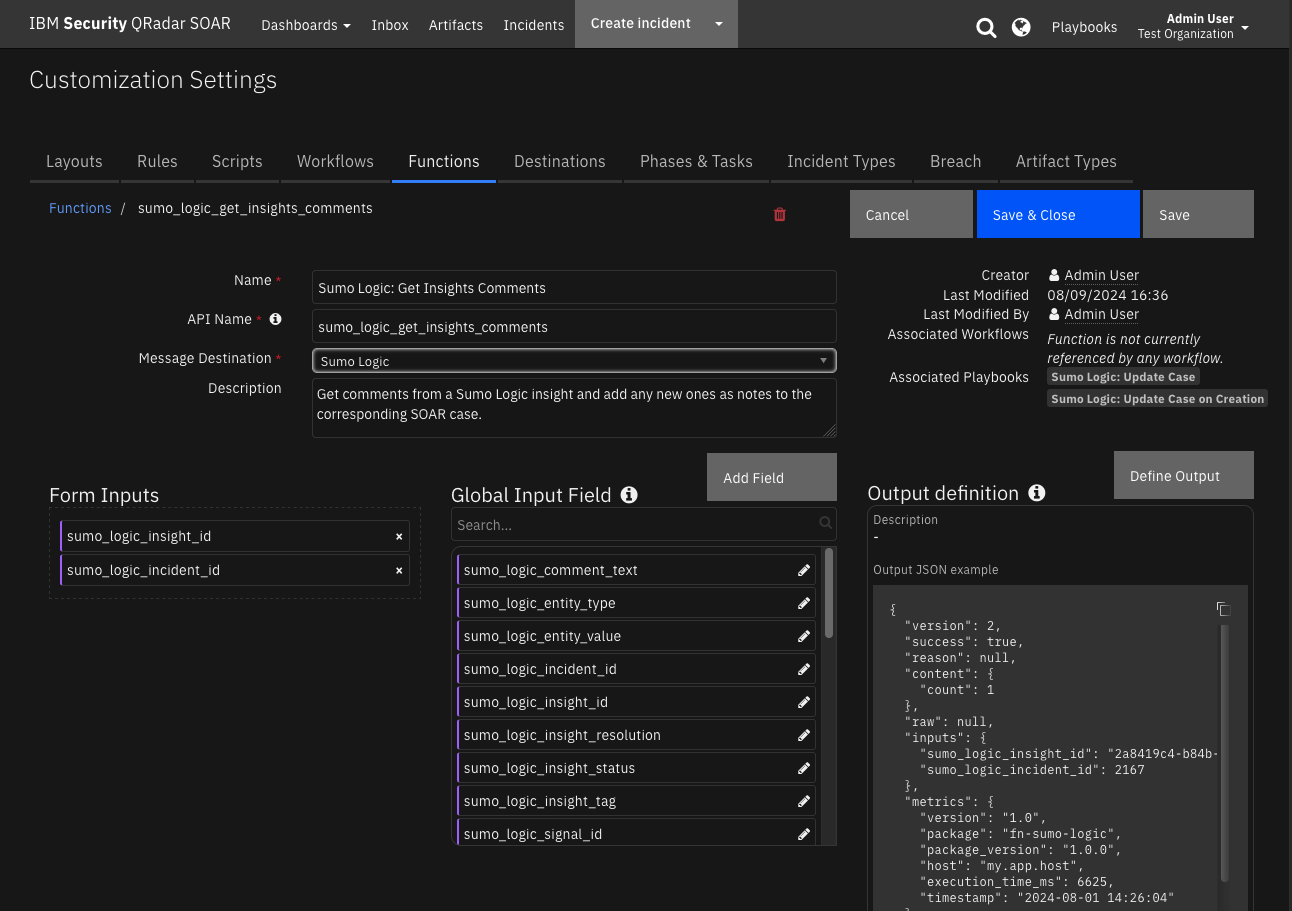
Inputs:
Name |
Type |
Required |
Example |
Tooltip |
|---|---|---|---|---|
|
|
Yes |
|
- |
|
|
Yes |
|
- |
Outputs:
NOTE: This example might be in JSON format, but
resultsis a Python Dictionary on the SOAR platform.
results = {
"content": {
"count": 1
},
"inputs": {
"sumo_logic_incident_id": 2167,
"sumo_logic_insight_id": "2a8419c4-b84b-3b6c-8447-af4ccbfba9c6"
},
"metrics": {
"execution_time_ms": 6625,
"host": "my.app.host",
"package": "fn-sumo-logic",
"package_version": "1.0.0",
"timestamp": "2024-08-01 14:26:04",
"version": "1.0"
},
"raw": null,
"reason": null,
"success": true,
"version": 2.0
}
Example Function Input Script:
inputs.sumo_logic_incident_id = incident.id
inputs.sumo_logic_insight_id = incident.properties.sumo_logic_insight_id
Example Function Post Process Script:
results = playbook.functions.results.get_insights_comments_results
if results.get("success"):
content = results.get("content")
if content:
note_text = "<b>Sumo Logic: Update Case on Creation - Get Insight Comments</b> function added {0} note(s) in SOAR.".format(content.get("count"))
else:
note_text = "<b>Sumo Logic: Update Case on Creation - Get Insight Comments</b> function failed to get notes from Sumo Logic."
else:
note_text = "<b>Sumo Logic: Update Case on Creation - Get Insight Comments</b> function failed to get notes from Sumo Logic."
incident.addNote(note_text)
Function - Sumo Logic: Get Signal by ID¶
Get the details of a Sumo Logic signal given the signal ID.
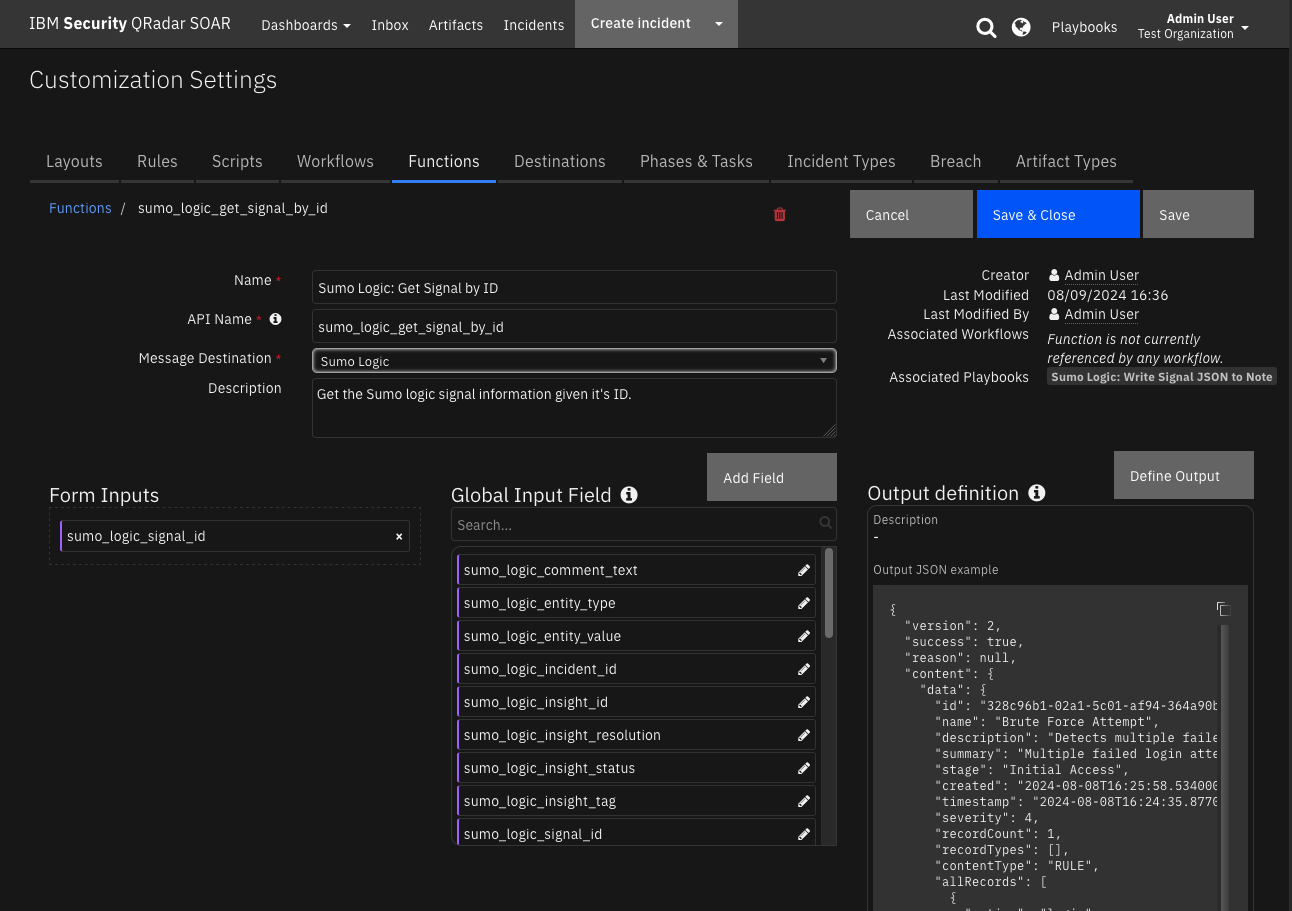
Inputs:
Name |
Type |
Required |
Example |
Tooltip |
|---|---|---|---|---|
|
|
Yes |
|
- |
Outputs:
NOTE: This example might be in JSON format, but
resultsis a Python Dictionary on the SOAR platform.
results = {
"content": {
"data": {
"allRecords": [
{
"action": "login",
"baseImage": "/usr/sbin/sshd",
"bro_dns_answers": [],
"bro_file_bytes": {},
"bro_file_connUids": [],
"bro_flow_service": [],
"bro_ftp_pendingCommands": [],
"bro_http_cookieVars": [],
"bro_http_origFuids": [],
"bro_http_origMimeTypes": [],
"bro_http_request_headers": {},
"bro_http_request_proxied": [],
"bro_http_response_headers": {},
"bro_http_response_respFuids": [],
"bro_http_response_respMimeTypes": [],
"bro_http_tags": [],
"bro_http_uriVars": [],
"bro_kerberos_clientCert": {},
"bro_kerberos_serverCert": {},
"bro_sip_headers": {},
"bro_sip_requestPath": [],
"bro_sip_responsePath": [],
"bro_ssl_certChainFuids": [],
"bro_ssl_clientCertChainFuids": [],
"cseSignal": {},
"day": 8,
"fieldTags": {},
"fields": {
"AUID": "unset",
"UID": "root",
"acct": "(unknown)",
"addr": "9.30.223.75",
"auid": "4294967295",
"event_id": "USER_LOGIN",
"exe": "/usr/sbin/sshd",
"msg": "audit(1723134275.877:33373):",
"op": "login",
"pid": "61267",
"res": "failed",
"ses": "4294967295",
"subj": "kernel",
"syslog_message": "type=USER_LOGIN msg=audit(1723134275.877:33373): pid=61267 uid=0 auid=4294967295 ses=4294967295 subj=kernel msg=\u0027op=login acct=\"(unknown)\" exe=\"/usr/sbin/sshd\" hostname=? addr=9.30.223.75 terminal=ssh res=failed\u0027\u001dUID=\"root\" AUID=\"unset\"",
"syslog_process": "systemdjournal",
"syslog_timestamp": "1723134275.877",
"terminal": "ssh",
"type": "USER_LOGIN",
"uid": "0"
},
"friendlyName": "record",
"hour": 16,
"http_requestHeaders": {},
"listMatches": [],
"matchedItems": [],
"metadata_deviceEventId": "USER_LOGIN",
"metadata_mapperName": "Linux OS Systemd Journal - Login Events",
"metadata_mapperUid": "0e5cbfbb-91ac-4658-918c-709c76d53f1e",
"metadata_orgId": "0000000000BD6D7C",
"metadata_parseTime": 1723134354974,
"metadata_parser": "/Parsers/System/Linux/Linux OS Syslog",
"metadata_product": "Systemd Journal",
"metadata_productGuid": "5be5af82-c248-4c4c-a485-0571025f242c",
"metadata_receiptTime": 1723134278,
"metadata_schemaVersion": 3,
"metadata_sensorId": "0000000000BD6D7C",
"metadata_sensorInformation": {},
"metadata_sensorZone": "default",
"metadata_sourceBlockId": "1864672286443784304",
"metadata_sourceCategory": "linux/system",
"metadata_sourceMessageId": "-6870926605261705032",
"metadata_vendor": "Linux",
"month": 8,
"normalizedAction": "logon",
"objectClassification": "Authentication",
"objectType": "Authentication",
"pid": 61267,
"srcDevice_ip": "9.30.223.75",
"srcDevice_ip_ipv4IntValue": 153018187,
"srcDevice_ip_isInternal": false,
"srcDevice_ip_version": 4,
"success": false,
"targetUser_username": "0",
"targetUser_username_raw": "0",
"timestamp": 1723134275877,
"uid": "6c825674-ab7b-5cf1-9250-ba35c9746835",
"user_username": "(unknown)",
"user_username_raw": "(unknown)",
"year": 2024
}
],
"artifacts": [],
"contentType": "RULE",
"created": "2024-08-08T16:25:58.534000",
"description": "Detects multiple failed login attempts for the same username over a 24 hour timeframe. This is designed to catch both slow and quick brute force type attacks. The threshold and time frame can be adjusted based on the customer\u0027s environment.",
"entity": {
"entityType": "_username",
"hostname": null,
"id": "_username-(unknown)",
"macAddress": null,
"name": "(unknown)",
"sensorZone": "",
"value": "(unknown)"
},
"id": "328c96b1-02a1-5c01-af94-364a90b9c0d6",
"involvedEntities": [
{
"entityType": "_ip",
"hostname": null,
"id": "_ip-9.30.223.75",
"macAddress": null,
"name": "9.30.223.75",
"sensorZone": "",
"value": "9.30.223.75"
},
{
"entityType": "_ip",
"hostname": null,
"id": "_ip-9.30.48.247",
"macAddress": null,
"name": "9.30.48.247",
"sensorZone": "",
"value": "9.30.48.247"
},
{
"entityType": "_process",
"hostname": null,
"id": "_process-/usr/sbin/sshd",
"macAddress": null,
"name": "/usr/sbin/sshd",
"sensorZone": "",
"value": "/usr/sbin/sshd"
},
{
"entityType": "_username",
"hostname": null,
"id": "_username-0",
"macAddress": null,
"name": "0",
"sensorZone": "",
"value": "0"
},
{
"entityType": "_username",
"hostname": null,
"id": "_username-(unknown)",
"macAddress": null,
"name": "(unknown)",
"sensorZone": "",
"value": "(unknown)"
}
],
"name": "Brute Force Attempt",
"recordCount": 1,
"recordSearchDetails": {
"query": "_index=sec_record_* | json field=_raw \"resultType\" as _unpacked__raw_resultType nodrop\n| where (if (isNull(objectType), false, objectType == \"Authentication\") and if (isNull(normalizedAction), false, normalizedAction == \"logon\") and if (isNull(success), false, !(success)) and !(if (isNull(metadata_deviceEventId), false, metadata_deviceEventId == \"Security-4776\") and !isBlank(listMatches) AND jsonArrayContains(listMatches, \"domain_controllers\")) and !(if (isNull(metadata_vendor), false, metadata_vendor == \"Microsoft\") and if (isNull(metadata_product), false, metadata_product == \"Azure\") and if (isNull(_unpacked__raw_resultType), false, _unpacked__raw_resultType == \"700082\")) and !(metadata_vendor in (\"Microsoft\", \"Intersect Alliance\") and metadata_product in (\"Windows\", \"Snare Enterprise Agent for Windows\") and user_username matches /^[\\s\\S]*\\$[\\s\\S]*$/) and !(!isBlank(listMatches) AND jsonArrayContains(listMatches, \"vuln_scanners\")) and if (isNull(metadata_deviceEventId), false, metadata_deviceEventId == \"USER_LOGIN\") and if (isNull(metadata_product), false, metadata_product == \"Systemd Journal\") and if (isNull(metadata_vendor), false, metadata_vendor == \"Linux\") and if (isNull(user_username), false, user_username == \"(unknown)\"))",
"queryEndTime": "2024-08-08T19:12:00",
"queryStartTime": "2024-08-07T19:12:00"
},
"recordTypes": [],
"ruleId": "THRESHOLD-S00096",
"severity": 4,
"stage": "Initial Access",
"summary": "Multiple failed login attempts for user: (unknown)",
"suppressed": false,
"tags": [
"_mitreAttackTactic:TA0006",
"_mitreAttackTechnique:T1078",
"_mitreAttackTactic:TA0001",
"_mitreAttackTechnique:T1110.001",
"_mitreAttackTechnique:T1110.002",
"_mitreAttackTactic:TA0008",
"_mitreAttackTechnique:T1110",
"_mitreAttackTechnique:T1586"
],
"threatIntelIndicatorIds": [],
"timestamp": "2024-08-08T16:24:35.877000"
},
"errors": []
},
"inputs": {
"sumo_logic_signal_id": "328c96b1-02a1-5c01-af94-364a90b9c0d6"
},
"metrics": {
"execution_time_ms": 19139,
"host": "my.app.host",
"package": "fn-sumo-logic",
"package_version": "1.0.0",
"timestamp": "2024-08-09 14:56:09",
"version": "1.0"
},
"raw": null,
"reason": null,
"success": true,
"version": 2.0
}
Example Function Input Script:
inputs.sumo_logic_signal_id = row.sumo_logic_signal_id
Example Function Post Process Script:
results = playbook.functions.results.get_signal_by_id_results
inputs = results.get("inputs", None)
signal_id = inputs.get("sumo_logic_signal_id", None)
header = u"<b>Sumo Logic: Get Signal by ID:</b> {0}".format(signal_id)
json_note = {
"version": "1.3",
"header": header,
"json": results.content,
"sort": False
}
playbook.addProperty('convert_json_to_rich_text', json_note)
Function - Sumo Logic: Update Insight Status¶
Update the status of an insight in Sumo Logic. If the status is set to closed, set the resolution reason.
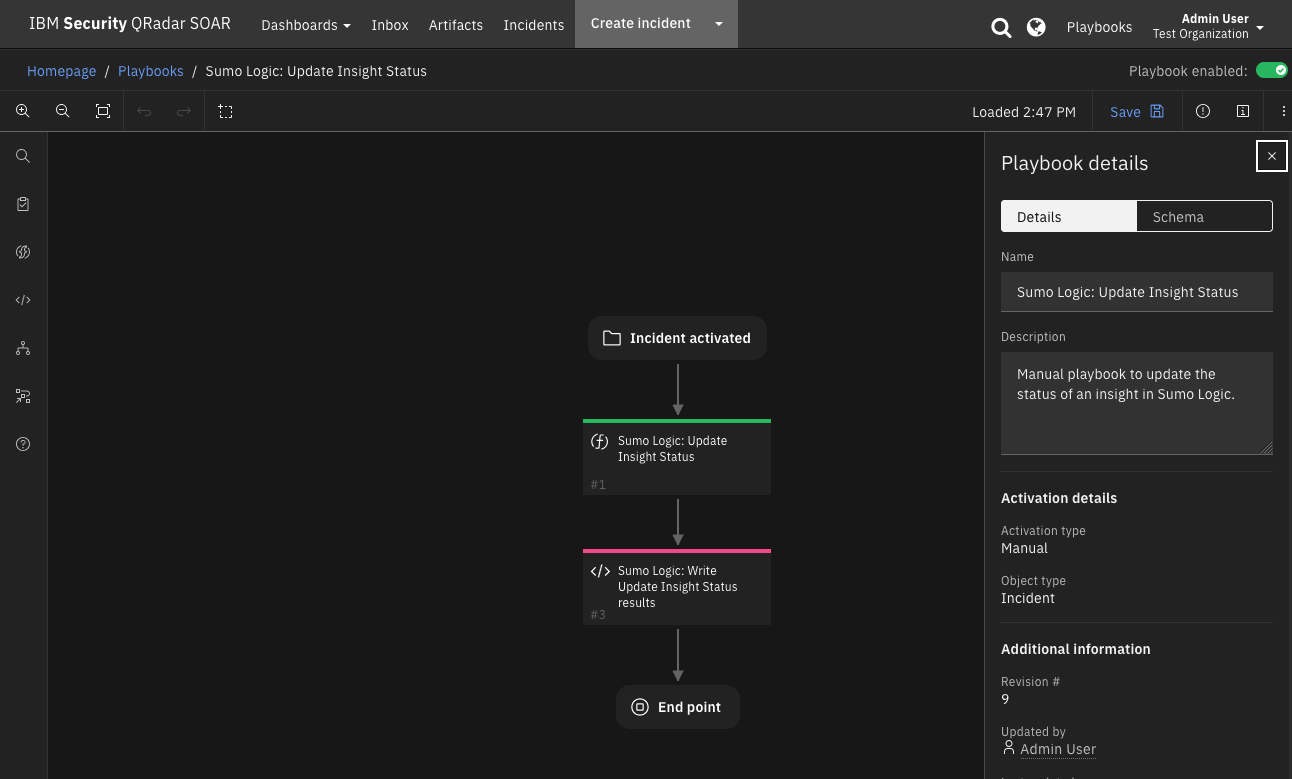
Dialog box to set an Insight’s status through a manual playbook:

Inputs:
Name |
Type |
Required |
Example |
Tooltip |
|---|---|---|---|---|
|
|
Yes |
|
- |
|
|
No |
|
- |
|
|
Yes |
|
- |
Outputs:
NOTE: This example might be in JSON format, but
resultsis a Python Dictionary on the SOAR platform.
results = {
"content": {
"data": {
"artifacts": [],
"assignedTo": null,
"assignee": null,
"closed": null,
"closedBy": null,
"confidence": 0.85,
"created": "2024-07-30T20:17:57.153553",
"description": "Initial Access",
"entity": {
"entityType": "_username",
"hostname": null,
"id": "_username-root",
"macAddress": null,
"name": "root",
"sensorZone": "",
"value": "root"
},
"id": "f741314d-34b6-3417-9c0a-426d547e345a",
"involvedEntities": [
{
"entityType": "_process",
"hostname": null,
"id": "_process-sshd",
"macAddress": null,
"name": "sshd",
"sensorZone": null,
"value": "sshd"
},
{
"entityType": "_username",
"hostname": null,
"id": "_username-root",
"macAddress": null,
"name": "root",
"sensorZone": null,
"value": "root"
},
{
"entityType": "_ip",
"hostname": null,
"id": "_ip-9.108.160.132",
"macAddress": null,
"name": "9.108.160.132",
"sensorZone": null,
"value": "9.108.160.132"
},
{
"entityType": "_hostname",
"hostname": "sumologic1",
"id": "_hostname-sumologic1",
"macAddress": null,
"name": "sumologic1",
"sensorZone": null,
"value": "sumologic1"
}
],
"lastUpdated": "2024-08-02T20:50:41.638872",
"lastUpdatedBy": null,
"name": "Initial Access",
"orgId": "0000000000BD6D7C",
"readableId": "INSIGHT-2",
"resolution": null,
"severity": "MEDIUM",
"signals": [
{
"allRecords": [
{
"baseImage": "sshd",
"bro_dns_answers": [],
"bro_file_bytes": {},
"bro_file_connUids": [],
"bro_flow_service": [],
"bro_ftp_pendingCommands": [],
"bro_http_cookieVars": [],
"bro_http_origFuids": [],
"bro_http_origMimeTypes": [],
"bro_http_request_headers": {},
"bro_http_request_proxied": [],
"bro_http_response_headers": {},
"bro_http_response_respFuids": [],
"bro_http_response_respMimeTypes": [],
"bro_http_tags": [],
"bro_http_uriVars": [],
"bro_kerberos_clientCert": {},
"bro_kerberos_serverCert": {},
"bro_sip_headers": {},
"bro_sip_requestPath": [],
"bro_sip_responsePath": [],
"bro_ssl_certChainFuids": [],
"bro_ssl_clientCertChainFuids": [],
"cseSignal": {},
"day": 30,
"device_hostname": "sumologic1",
"device_hostname_raw": "sumologic1",
"dstDevice_hostname": "sumologic1",
"dstDevice_hostname_raw": "sumologic1",
"fieldTags": {},
"fields": {
"event_id": "sshd-failed-invalid-password",
"source_ip": "9.108.160.132",
"source_port": "53371",
"ssh_version": "ssh2",
"syslog_hostname": "sumologic1",
"syslog_message": "Failed password for root from 9.108.160.132 port 53371 ssh2",
"syslog_process": "sshd",
"syslog_process_id": "35224",
"syslog_timestamp": "Jul 30 13:17:19",
"user": "root"
},
"friendlyName": "record",
"hour": 13,
"http_requestHeaders": {},
"listMatches": [],
"matchedItems": [],
"metadata_deviceEventId": "sshd-failed-invalid-password",
"metadata_mapperName": "Linux OS Syslog - Process sshd - SSH Auth Failure Invalid Password",
"metadata_mapperUid": "05445189-0e1e-425a-8f2b-5d1f41e9546e",
"metadata_orgId": "0000000000BD6D7C",
"metadata_parseTime": 1722370665323,
"metadata_parser": "/Parsers/System/Linux/Linux OS Syslog",
"metadata_product": "Linux OS Syslog",
"metadata_productGuid": "0e20c932-d992-4bd4-b276-c15119ca5c0b",
"metadata_receiptTime": 1722370640,
"metadata_schemaVersion": 3,
"metadata_sensorId": "0000000000BD6D7C",
"metadata_sensorInformation": {},
"metadata_sensorZone": "default",
"metadata_sourceBlockId": "2295449033841068855",
"metadata_sourceCategory": "linux/system",
"metadata_sourceMessageId": "-7272543713819412727",
"metadata_vendor": "Linux",
"month": 7,
"normalizedAction": "logon",
"objectClassification": "Authentication",
"objectType": "Authentication",
"pid": 35224,
"srcDevice_ip": "9.108.160.132",
"srcDevice_ip_ipv4IntValue": 158113924,
"srcDevice_ip_isInternal": false,
"srcDevice_ip_version": 4,
"srcPort": 53371,
"success": false,
"timestamp": 1722345439000,
"uid": "aac19471-8442-5536-9742-bcc5aacc1e80",
"user_username": "root",
"user_username_raw": "root",
"year": 2024
}
],
"artifacts": [],
"contentType": "RULE",
"created": "2024-07-30T13:17:19",
"description": "Detects multiple failed login attempts for the same username over a 24 hour timeframe. This is designed to catch both slow and quick brute force type attacks. The threshold and time frame can be adjusted based on the customer\u0027s environment.",
"entity": {
"entityType": "_username",
"hostname": null,
"id": "_username-root",
"macAddress": null,
"name": "root",
"sensorZone": "",
"value": "root"
},
"id": "f16f0e84-66c4-50c7-a0b2-b02b5cbdd543",
"name": "Brute Force Attempt",
"recordCount": 1,
"recordSearchDetails": {
"query": "_index=sec_record_* | json field=_raw \"resultType\" as _unpacked__raw_resultType nodrop\n| where (if (isNull(objectType), false, objectType == \"Authentication\") and if (isNull(normalizedAction), false, normalizedAction == \"logon\") and if (isNull(success), false, !(success)) and !(if (isNull(metadata_deviceEventId), false, metadata_deviceEventId == \"Security-4776\") and !isBlank(listMatches) AND jsonArrayContains(listMatches, \"domain_controllers\")) and !(if (isNull(metadata_vendor), false, metadata_vendor == \"Microsoft\") and if (isNull(metadata_product), false, metadata_product == \"Azure\") and if (isNull(_unpacked__raw_resultType), false, _unpacked__raw_resultType == \"700082\")) and !(metadata_vendor in (\"Microsoft\", \"Intersect Alliance\") and metadata_product in (\"Windows\", \"Snare Enterprise Agent for Windows\") and user_username matches /^[\\s\\S]*\\$[\\s\\S]*$/) and !(!isBlank(listMatches) AND jsonArrayContains(listMatches, \"vuln_scanners\")) and if (isNull(metadata_deviceEventId), false, metadata_deviceEventId == \"sshd-failed-invalid-password\") and if (isNull(metadata_product), false, metadata_product == \"Linux OS Syslog\") and if (isNull(metadata_vendor), false, metadata_vendor == \"Linux\") and if (isNull(user_username), false, user_username == \"root\"))",
"queryEndTime": "2024-07-30T14:24:00",
"queryStartTime": "2024-07-29T14:24:00"
},
"recordTypes": [],
"ruleId": "THRESHOLD-S00096",
"severity": 4,
"stage": "Initial Access",
"tags": [
"_mitreAttackTactic:TA0006",
"_mitreAttackTechnique:T1078",
"_mitreAttackTactic:TA0001",
"_mitreAttackTechnique:T1110.001",
"_mitreAttackTechnique:T1110.002",
"_mitreAttackTactic:TA0008",
"_mitreAttackTechnique:T1110",
"_mitreAttackTechnique:T1586"
],
"timestamp": "2024-07-30T13:17:19"
}
],
"source": "ALGORITHM",
"status": {
"displayName": "New",
"name": "new"
},
"subResolution": null,
"tags": [
"AnnMarie-2",
"AnnMarie tag",
"_mitreAttackTactic:TA0001",
"_mitreAttackTactic:TA0006",
"_mitreAttackTactic:TA0008",
"_mitreAttackTechnique:T1078",
"_mitreAttackTechnique:T1110",
"_mitreAttackTechnique:T1110.001",
"_mitreAttackTechnique:T1110.002",
"_mitreAttackTechnique:T1586"
],
"teamAssignedTo": null,
"timeToDetection": 25238.153553,
"timeToRemediation": null,
"timeToResponse": 147653.411281,
"timestamp": "2024-07-30T13:17:19"
},
"errors": []
},
"inputs": {
"sumo_logic_insight_id": "f741314d-34b6-3417-9c0a-426d547e345a",
"sumo_logic_insight_resolution": null,
"sumo_logic_insight_status": "New"
},
"metrics": {
"execution_time_ms": 64088,
"host": "my.app.host",
"package": "fn-sumo-logic",
"package_version": "1.0.0",
"timestamp": "2024-08-02 16:51:21",
"version": "1.0"
},
"raw": null,
"reason": null,
"success": true,
"version": 2.0
}
Example Function Input Script:
inputs.sumo_logic_insight_id = incident.properties.sumo_logic_insight_id
inputs.sumo_logic_insight_status = playbook.inputs.sumo_logic_insight_status
inputs.sumo_logic_insight_resolution = playbook.inputs.sumo_logic_insight_resolution
if inputs.sumo_logic_insight_status == "Closed" and not playbook.inputs.sumo_logic_insight_resolution:
helper.fail("Resolution musted be specified if status is Closed.")
Example Function Post Process Script:
results = playbook.functions.results.update_insight_status_results
if results.get("success"):
note_text = f"<b>Sumo Logic: Update Insight Status: </b> set:<br>"
if playbook.inputs.sumo_logic_insight_status:
incident.properties.sumo_logic_insight_status = playbook.inputs.sumo_logic_insight_status
note_text = f"{note_text}<br> Status: {playbook.inputs.sumo_logic_insight_status}"
if playbook.inputs.sumo_logic_insight_resolution and playbook.inputs.sumo_logic_insight_status == 'Closed':
incident.properties.sumo_logic_insight_resolution = playbook.inputs.sumo_logic_insight_resolution
note_text = f"{note_text}<br> Resolution: {playbook.inputs.sumo_logic_insight_resolution}"
# Uncomment if sub_resolution is implemented.
#if playbook.inputs.sumo_logic_insight_sub_resolution and playbook.inputs.sumo_logic_insight_status == 'Closed':
# incident.properties.sumo_logic_insight_sub_resolution = playbook.inputs.sumo_logic_insight_sub_resolution
# note_text = f"{note_text}<br> Sub Resolution: {playbook.inputs.sumo_logic_insight_sub_resolution"
else:
reason = results.get("reason")
note_text = f"<b>Sumo Logic: Update Insight Status: </b> failed to update status to <b>{playbook.inputs.sumo_logic_insight_status}</b>:<br> {reason}"
incident.addNote(note_text)
Script - Convert JSON to rich text v1.3¶
This script converts a json object into a hierarchical display of rich text and adds the rich text to an incident’s rich text (custom) field or an incident note. A workflow property is used to share the json to convert and identify parameters used on how to perform the conversion. Typically, a function will create workflow property and this script will run after that function to perform the conversion.
Features:
Display the hierarchical nature of json, presenting the json keys (sorted if specified) as bold labels
Provide links to found URLs
Create either an incident note or add results to an incident (custom) rich text field.
Object: incident
Script Text:
# (c) Copyright IBM Corp. 2010, 2023. All Rights Reserved.
VERSION = 1.3
"""
This script converts a json object into a hierarchical display of rich text and adds the rich text to an incident's rich text (custom) field or an incident note.
A workflow property is used to define the json to convert and identify parameters used on how to perform the conversion.
Typically, a function will create workflow property and this script will run after that function to perform the conversion.
Features:
* Display the hierarchical nature of json, presenting the json keys as bold labels
* Provide links to found URLs
* Create either an incident note or add results to an incident (custom) rich text field.
In order to use this script, define a workflow property called: convert_json_to_rich_text, to define the json and parameters to use for the conversion.
Workflow properties can be added using a command similar to this:
workflow.addProperty('convert_json_to_rich_text', {
"version": 1.3,
"header": "Artifact scan results for: {}".format(artifact.value),
"padding": 10,
"separator": u"<br />",
"sort": True,
"json": results.content,
"json_omit_list": ["omit"],
"incident_field": None
})
Format of workflow.property.convert_json_to_rich_text:
{
"version": 1.3, [this is for future compatibility]
"header": str, [header line to add to converted json produced or None. Ex: Results from scanning artifact: xxx. The header may contain rich text tags]
"padding": 10, [padding for nested json elements, or defaults to 10]
"separator": u"<br />"|list such as ['<span>','</span>'], [html separator between json keys and lists or defaults to html break: '<br />'.
If a list, then the data is brackets by the pair specified]
"sort": True|False, [sort the json keys at each level when displayed]
"json": json, [required json to convert]
"json_omit_list": [list of json keys to exclude or None]
"incident_field": "<incident_field>" [indicates a builtin rich text incident field, such as 'description'
or a custom rich text field in the format: 'properties.<field>'. default: create an incident note]
}
For playbooks, use playbook.addProperty() with the same format as workflow.addProperty()
Playbooks can also use playbook.functions.results.convert_json_to_rich_text using the standard function output which contains the 'content' json element.
When using playbook.functions.results.convert_json_to_rich_text with standard function results, all the defaults for padding, separator, etc. are used.
"""
import re
# needed for python 3
try:
unicode("abc") # fails in py3
py2 = True
except:
unicode = str
py2 = False
rc = re.compile(r'http[s]?://(?:[a-zA-Z]|[0-9]|[$-_@.&+#\?]|[!*\(\),]|(?:%[0-9a-fA-F][0-9a-fA-F]))+')
class ConvertJson:
"""Class to hold the conversion parameters and perform the conversion"""
def __init__(self, omit_keys=[], padding=10, separator=u"<br />", sort_keys=False):
self.omit_keys = omit_keys
self.padding = padding
self.separator = separator
self.sort_keys = sort_keys
def format_link(self, item):
"""[summary]
Find embedded urls (http(s)) and add html anchor tags to display as links
Args:
item ([string])
Returns:
[str]: None|original text if no links|text with html links
"""
formatted_item = item
if py2:
num_type = bool(item and isinstance(item, (int, long, bool, float)))
else:
num_type = bool(item and isinstance(item, (int, bool, float)))
if item and not num_type:
list = rc.findall(item)
if list:
for link in list:
formatted_item = formatted_item.replace(link, u"<a target='blank' href='{0}'>{0}</a>".format(link))
return formatted_item
def expand_list(self, list_value, is_list=False):
"""[summary]
convert items to html, adding indents to nested dictionaries.
Args:
list_value ([dict|list]): json element
Returns:
[str]: html converted code
"""
if not isinstance(list_value, list):
return self.format_link(list_value)
elif not list_value:
return u"None<br>"
try:
items_list = [] # this will ensure list starts on second line of key label
for item in list_value:
if isinstance(item, dict):
result = self.convert_json_to_rich_text(item)
if is_list:
items_list.append(u"<li>{}</li>".format(result))
else:
items_list.append(result)
elif isinstance(item, list):
items_list.append(self.expand_list(item, is_list=True))
elif is_list:
items_list.append(u"<li>{}</li>".format(self.format_link(unicode(item))))
else:
items_list.append(self.format_link(unicode(item)))
expand_list_result = self.add_separator(self.separator if not is_list else u"",
items_list,
is_list=is_list)
if is_list:
return u"<ul>{}</ul>".format(expand_list_result)
else:
return u"<div style='padding:5px'>{}</div>".format(expand_list_result)
except Exception as err:
return str(err)
def convert_json_to_rich_text(self, sub_dict):
"""[summary]
Walk dictionary tree and convert to html for better display
Args:
sub_dict ([type]): [description]
Returns:
[type]: [description]
"""
notes = []
if sub_dict and isinstance(sub_dict, (list, dict)):
if isinstance(sub_dict, list):
expanded_list = self.expand_list(sub_dict, is_list=True)
notes.append(self.add_separator(self.separator, expanded_list))
else:
keys = sorted (sub_dict.keys()) if self.sort_keys else sub_dict.keys()
for key in keys:
if key not in self.omit_keys:
value = sub_dict[key]
is_list = isinstance(value, list)
item_list = [u"<strong>{0}</strong>: ".format(key)]
if isinstance(value, dict):
convert_result = self.convert_json_to_rich_text(value)
if convert_result:
item_list.append(u"<div style='padding:{}px'>{}</div>".format(self.padding, convert_result))
else:
item_list.append(u"None<br>")
else:
item_list.append(self.expand_list(value, is_list=is_list))
notes.append(self.add_separator(self.separator, u"".join(make_unicode(v) for v in item_list), is_list=is_list))
result_notes = u"".join(notes)
if isinstance(self.separator, list):
return result_notes
else:
return result_notes.replace(
u"</div>{0}".format(self.separator), u"</div>").replace(
u"{0}</div>".format(self.separator), u"</div>"
) # tighten up result
def add_separator(self, separator, items, is_list=False):
"""
apply the separator to the data
:param separator: None, str or list such as ['<span>', '</span>']
:param items: str or list to add separator
:return: text with separator applied
"""
_items = items
if not _items:
return "<br>"
if not isinstance(_items, list):
_items = [_items]
if isinstance(separator, list):
return u"".join([u"{}{}{}".format(separator[0], item, separator[1]) for item in _items])
return u"{}{}".format(separator.join(_items), separator if not is_list else u"")
def make_unicode(value):
if value is None:
return 'None'
return unicode(value)
def get_results(property_name):
if playbook and playbook.functions.results[property_name] is not None:
return playbook.functions.results[property_name]
elif playbook and playbook.properties[property_name] is not None:
return playbook.properties[property_name]
elif workflow and workflow.properties[property_name] is not None:
return workflow.properties[property_name]
return None
def get_properties(property_name):
"""
Logic to collect the json and parameters from a workflow property.
Args:
property_name: workflow property to reference
Returns:
padding, separator, header, json_omit_list, incident_field, json, sort_keys
"""
result_properties = get_results(property_name)
if not result_properties:
helper.fail("Playbook/workflow property not found: {}".format(property_name))
padding = int(result_properties.get("padding", 10))
separator = result_properties.get("separator", u"<br />")
if isinstance(separator, list) and len(separator) != 2:
helper.fail("list of separators should be specified as a pair such as ['<div>', '</div>']: {}".format(separator))
header = result_properties.get("header")
sort_keys = bool(result_properties.get("sort", False))
json_omit_list = result_properties.get("json_omit_list")
if not json_omit_list:
json_omit_list = []
incident_field = result_properties.get("incident_field")
# workflow formatted content is 'json'. Standard functions is 'content'
json = result_properties.get("json") if result_properties.get("json") else result_properties.get("content")
json_err = None
# is there an issue we need handle now?
if not json and \
result_properties.get("success") == False and result_properties.get("reason"):
json_err = result_properties.get("reason")
return padding, separator, header, json_omit_list, incident_field, json, json_err, sort_keys
## S T A R T
padding, separator, header, json_omit_list, incident_field, json, json_err, sort_keys = get_properties('convert_json_to_rich_text')
if json_err:
result = "Result error: {}".format(json_err)
else:
if header:
if isinstance(separator, list):
hdr = u"{0}{1}{2}".format(separator[0], header, separator[1])
else:
hdr = u"{0}{1}".format(header, separator)
else:
hdr = u""
convert = ConvertJson(omit_keys=json_omit_list, padding=padding, separator=separator, sort_keys=sort_keys)
converted_json = convert.convert_json_to_rich_text(json)
result = u"{}{}".format(hdr, converted_json if converted_json else "\nNone")
rich_text_note = helper.createRichText(result)
if incident_field:
incident[incident_field] = rich_text_note
else:
incident.addNote(rich_text_note)
Script - Sumo Logic: Add Artifacts from Insight¶
Create artifacts in SOAR from the Sumo Logic Get Insight by ID function and write the results to a note.
Object: incident
Script Text:
ARTIFACT_TYPE_MAPPING = {
"_ip": "IP Address",
"_hostname": "DNS Name",
"_file": "File Path",
"_mac": "MAC Address",
"_process": "Process Name",
"_username": "User Account",
"_useragent": "User Agent",
"_url": "URL"
}
results = playbook.functions.results.get_insight_by_id_results
note_text = "<b>Sumo Logic: Add Artifacts from Insight:</b>"
if results.get("success", False):
content = results.get("content", {})
if content:
data = content.get("data", None)
if data:
involved_entities = data.get("involvedEntities", [])
artifact_count = 0
for entity in involved_entities:
entity_type = ARTIFACT_TYPE_MAPPING.get(entity.get("entityType"), None)
entity_value = entity.get("value", None)
if entity_type and entity_value:
incident.addArtifact(entity_type, entity_value, f"Artifact created from Sumo Logic insight {incident.properties.sumo_logic_insight_readable_id}")
artifact_count += 1
else:
note_text = f"{note_text}<br>Unable to create artifact from entity: {entity}"
note_text = f"{note_text}<br>{artifact_count} artifact(s) created."
else:
note_text = f"{note_text}<br>no data found in insight results."
else:
note_text = f"{note_text}<br>no content found in insight results."
else:
note_text = f"{note_text}<br>results found in insight results."
incident.addNote(note_text)
Script - Sumo Logic: Populate Signals Data Table¶
Populate the Signals data table with results from get insight function.
Object: incident
Script Text:
results = playbook.functions.results.get_insight_by_id_results
note_text = f"<b>Sumo Logic: Populate Signals Data Table:</b>"
if results.get("success", False):
content = results.get("content", {})
if content:
data = content.get("data", None)
if data:
signals = data.get("signals", [])
for signal in signals:
signal_row = incident.addRow("sumo_logic_insight_signals_dt")
signal_row.sumo_logic_signal_timestamp = signal.get("timestamp", None)
signal_row.sumo_logic_signal_id = signal.get("id", None)
signal_row.sumo_logic_signal_name = signal.get("name", None)
signal_row.sumo_logic_signal_stage = signal.get("stage", None)
signal_row.sumo_logic_signal_description = signal.get("description", None)
signal_row.sumo_logic_signal_rule_id = signal.get("ruleId", None)
signal_row.sumo_logic_signal_severity = str(signal.get("severity")) if signal.get("severity", None) else None
num_signals = len(signals)
note_text = f"{note_text} {num_signals} signal(s) written to Signals data table."
else:
note_text = f"{note_text} Failed - no data found."
else:
note_text = f"{note_text} Failed - no data content found."
else:
reason = results.get("reason", "No reason")
note_text = f"{note_text} Failed - {reason}"
incident.addNote(note_text)
Playbooks¶
Playbook Name |
Description |
Activation Type |
Object |
Status |
Condition |
|---|---|---|---|---|---|
Sumo Logic: Add Comment to Insight |
Manual playbook to add a comment to a Sumo Logic insight in Sumo Logic. |
Manual |
note |
|
|
Sumo Logic: Add Tag to Insight |
Manual playbook to add a tag to a Sumo Logic insight. |
Manual |
incident |
|
|
Sumo Logic: Close Insight on Case Close |
Automatic playbook that updates the Status and Resolution of the associated insight in Sumo Logic when the cases is closed in SOAR. The SOAR case resolution summary is written as a comment to the Sumo Logic insight. |
Automatic |
incident |
|
|
Sumo Logic: Scan Artifact for Hits |
Scan artifacts added to Sumo Logic case and add hit if |
Manual |
artifact |
|
|
Sumo Logic: Scan Artifact for Hits Automatic |
Automatic playbook to scan artifacts added to Sumo Logic case and add hit on artifact if recent Signal Severity Total is greater than specified threshold value. |
Automatic |
artifact |
|
|
Sumo Logic: Update Case |
Manual playbook to update Sumo Logic case. Custom fields, data tables and comments are updated in the SOAR case. |
Manual |
incident |
|
|
Sumo Logic: Update Case on Creation |
Automatic playbook to update Sumo Logic case when the case is created. Custom fields, data tables and comments are updated in the SOAR case. |
Automatic |
incident |
|
|
Sumo Logic: Update Insight Status |
Manual playbook to update the status of an insight in Sumo Logic. |
Manual |
incident |
|
|
Sumo Logic: Write Entity JSON to Note |
Write the Sumo Logic entity JSON to an incident note in SOAR. |
Manual |
artifact |
|
|
Sumo Logic: Write Insight JSON to Note |
Write the Sumo Logic insight JSON to an incident note in SOAR. |
Manual |
incident |
|
|
Sumo Logic: Write Signal JSON to Note |
Write the Sumo Logic signal JSON to an incident note in SOAR. |
Manual |
sumo_logic_insight_signals_dt |
|
|
Custom Layouts¶
A custom layout Sumo Logic tab is included that contains Custom Fields and Signals Data Tables and Custom Fields like the screenshot below:
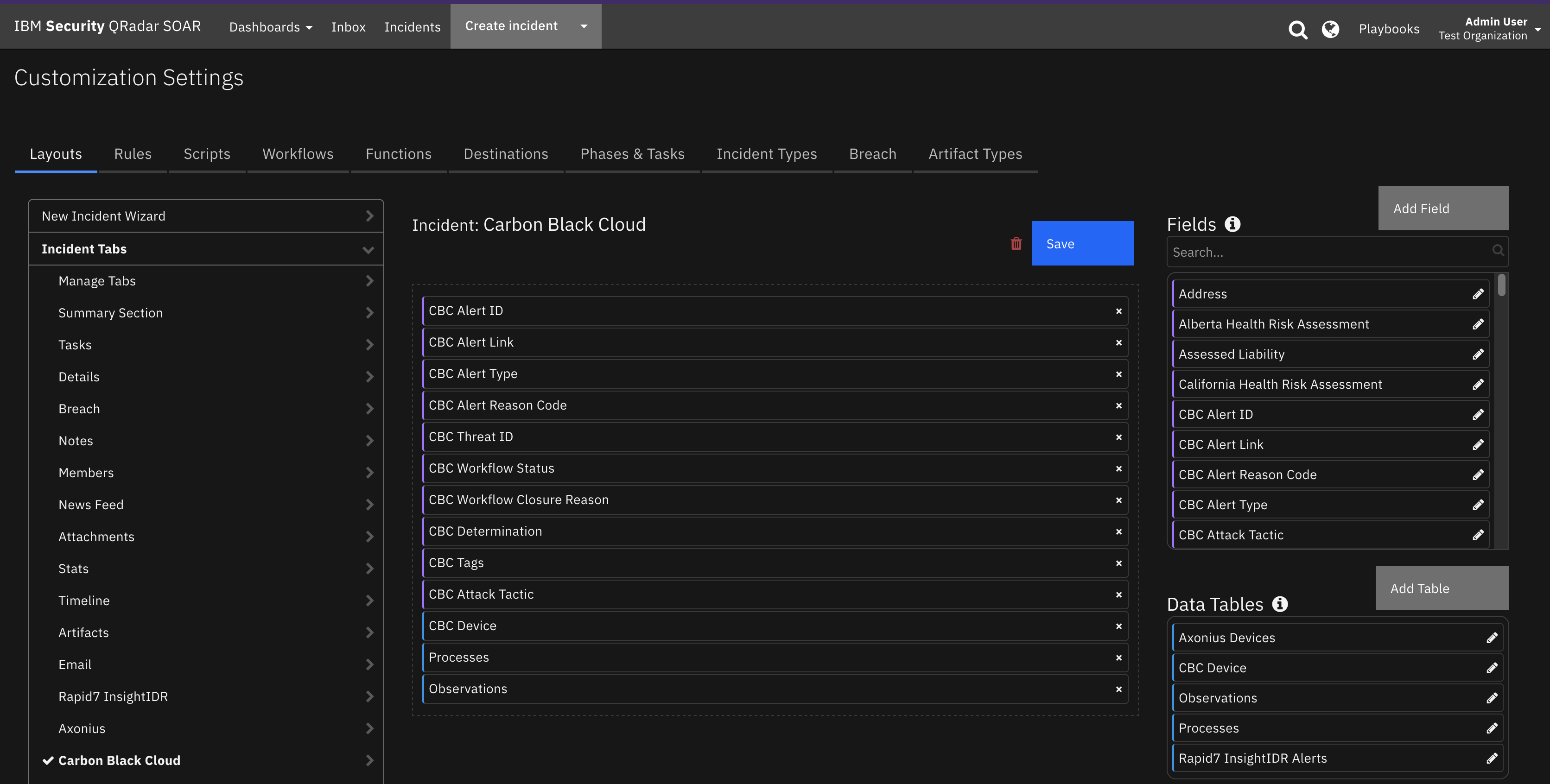
Sumo Logic Incident tab example:
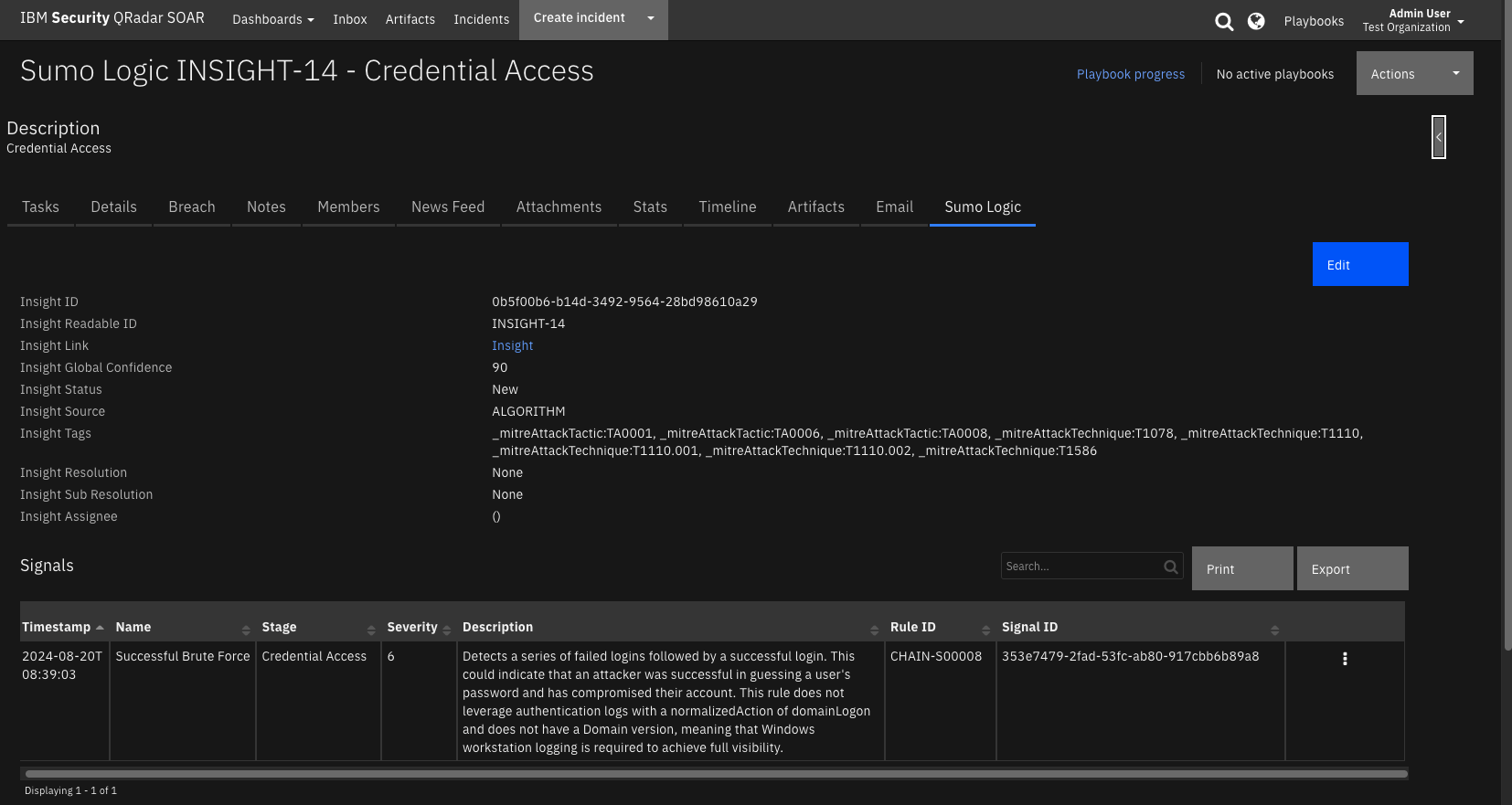
Data Table - Signals¶

API Name:¶
sumo_logic_insight_signals_dt
Columns:¶
Column Name |
API Access Name |
Type |
Tooltip |
|---|---|---|---|
Description |
|
|
- |
Name |
|
|
- |
Rule ID |
|
|
- |
Severity |
|
|
- |
Signal ID |
|
|
- |
Stage |
|
|
- |
Timestamp |
|
|
- |
Custom Fields¶
Label |
API Access Name |
Type |
Prefix |
Placeholder |
Tooltip |
|---|---|---|---|---|---|
Insight Assignee |
|
|
|
- |
- |
Insight Global Confidence |
|
|
|
- |
- |
Insight ID |
|
|
|
- |
- |
Insight Link |
|
|
|
- |
- |
Insight Readable ID |
|
|
|
- |
- |
Insight Resolution |
|
|
|
- |
- |
Insight Source |
|
|
|
- |
- |
Insight Status |
|
|
|
- |
- |
Insight Sub Resolution |
|
|
|
- |
- |
Insight Tags |
|
|
|
- |
- |
Troubleshooting & Support¶
Refer to the documentation listed in the Requirements section for troubleshooting information.
For Support¶
This is an IBM supported app. Please search ibm.com/mysupport for assistance.